- UID
- 4946
- 注册时间
- 2014-4-14
- 在线时间
- 小时
- 最后登录
- 1970-1-1
- 精华
- 阅读权限
- 30
- 听众
- 收听
|
源自@张德浩没有醉
驾驶舱理念 FCTM-AOP-10-20-10
空客飞机驾驶舱的设计通过飞机操作环境满足飞行机组的操作需求, 同时保证电传操纵家族最大的共性。
A320系列飞机驾驶舱面板布局
顶板 Overhead Panel
遮光板 Glareshield
主仪表板 Main Instrument Panel
中央操纵台 Pedestal
侧操纵台 Lateral Consoles
脚蹬 Pedals
设计理念 FCTM-AOP-10-20-20
OVERHEAD PANEL 顶板
与发动机相连的系统控制面板是垂直布局的,以便能直接并本能的完成正常/非正常程序。此外,这个布局的目的是尽可能减少飞行机组的错误。
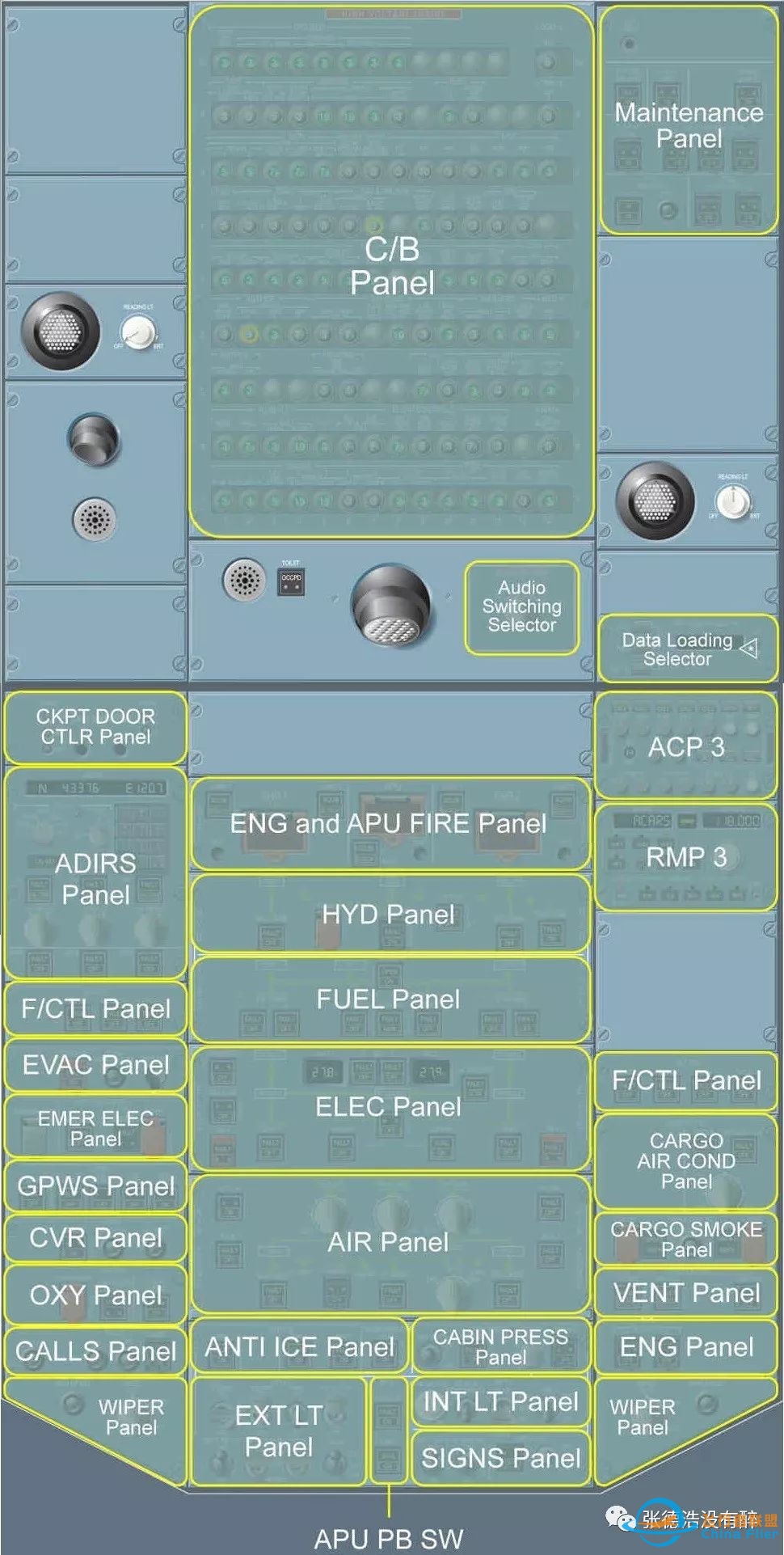
GLARESHIELD 遮光板
遮光板支持自动飞行系统(AFS)的短期的策略控制。可以“抬头”进行操纵并对于两名飞行员都能容易进行操纵。

MAIN INSTRUMENT PANEL 主仪表板
主仪表板主要支持对于以下功能是必须的显示组件:
‐ FLY 飞行 (PFD )
‐ NAVIGATE 导航 (ND)
‐ COMMUNICATE 通讯 (DCDU(新飞机部分选装))
‐ MONITOR the various aircraft systems 监控各个飞机系统 (ECAM).
The display units are located in the full and non-obstructed view of both pilots.
显示组件位于两名飞行员全部并无遮挡的视野中。

PEDESTAL 中央操纵台
中央操纵台主要支持以下控制:
‐ 发动机和推力(发动机主电门,推力手柄)
‐ 飞机形态(减速板手柄,襟翼手柄,方向舵配平)
‐ 导航(MCDU, FMS)
‐ 通信(RMP).
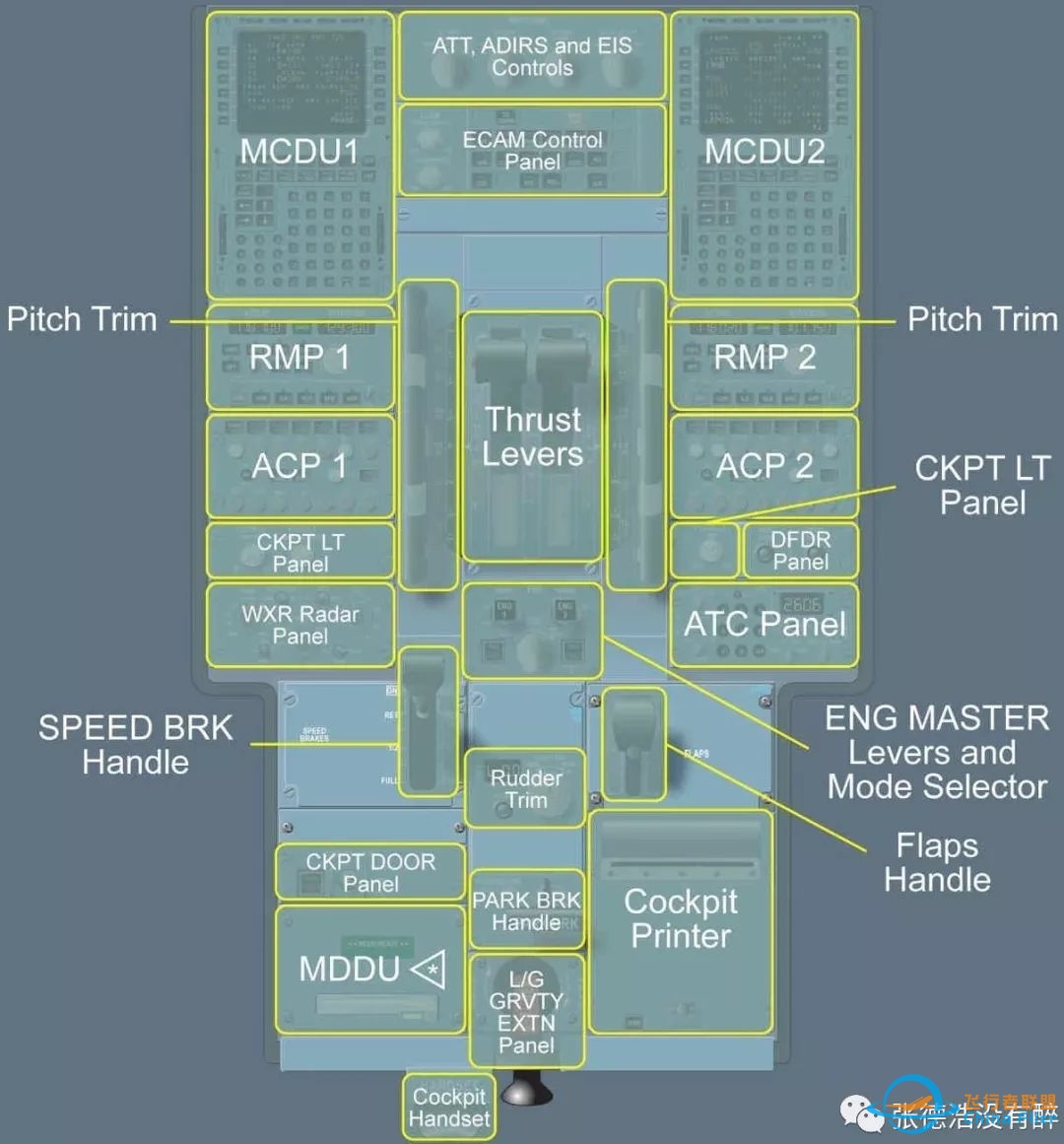
风挡参考 CCOM/05-020 Clearview Windows
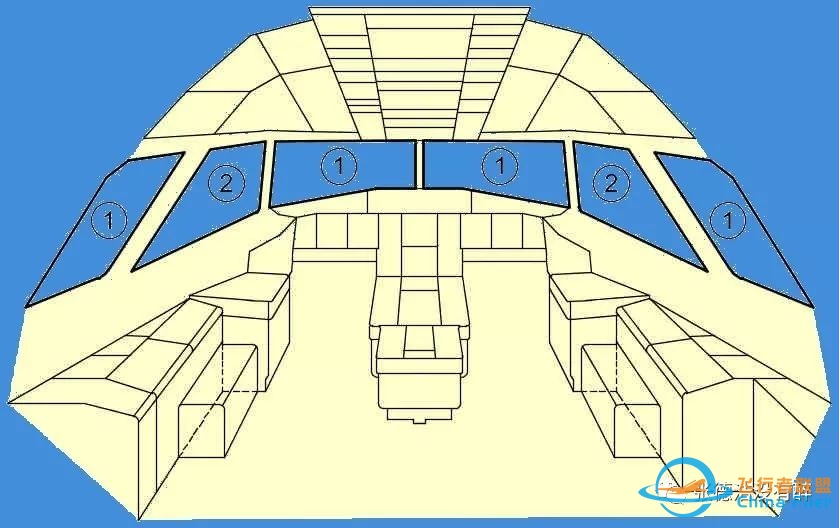
fixed windows
sliding windows
侧窗操作 参考FCOM/DSC-56-40 Sliding Windows
驾驶舱照明 FCOM/DSC-33-10 Cockpit Lighting
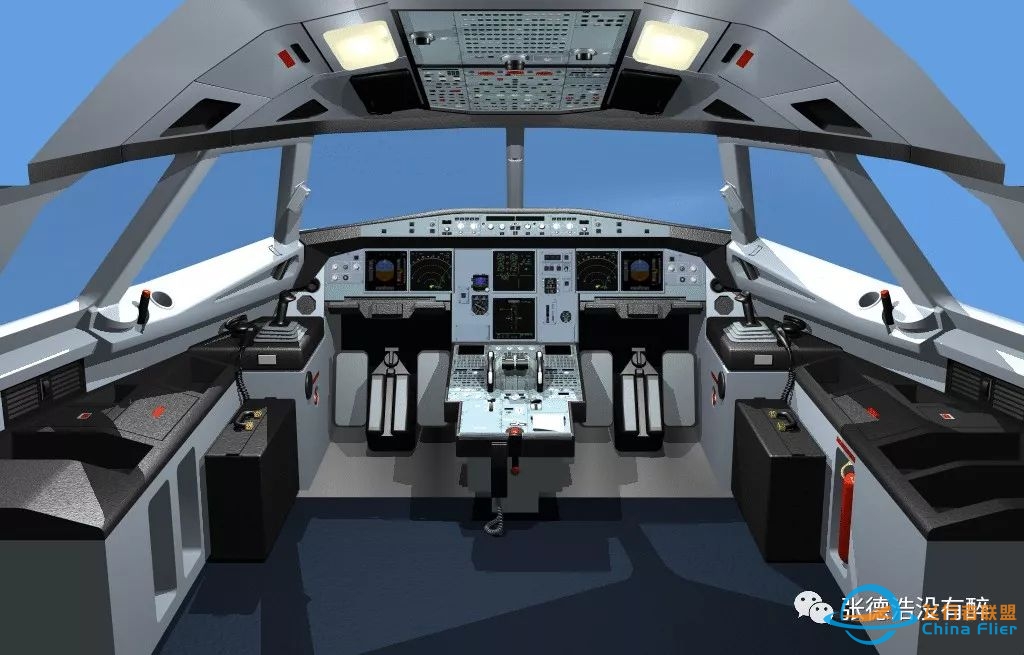
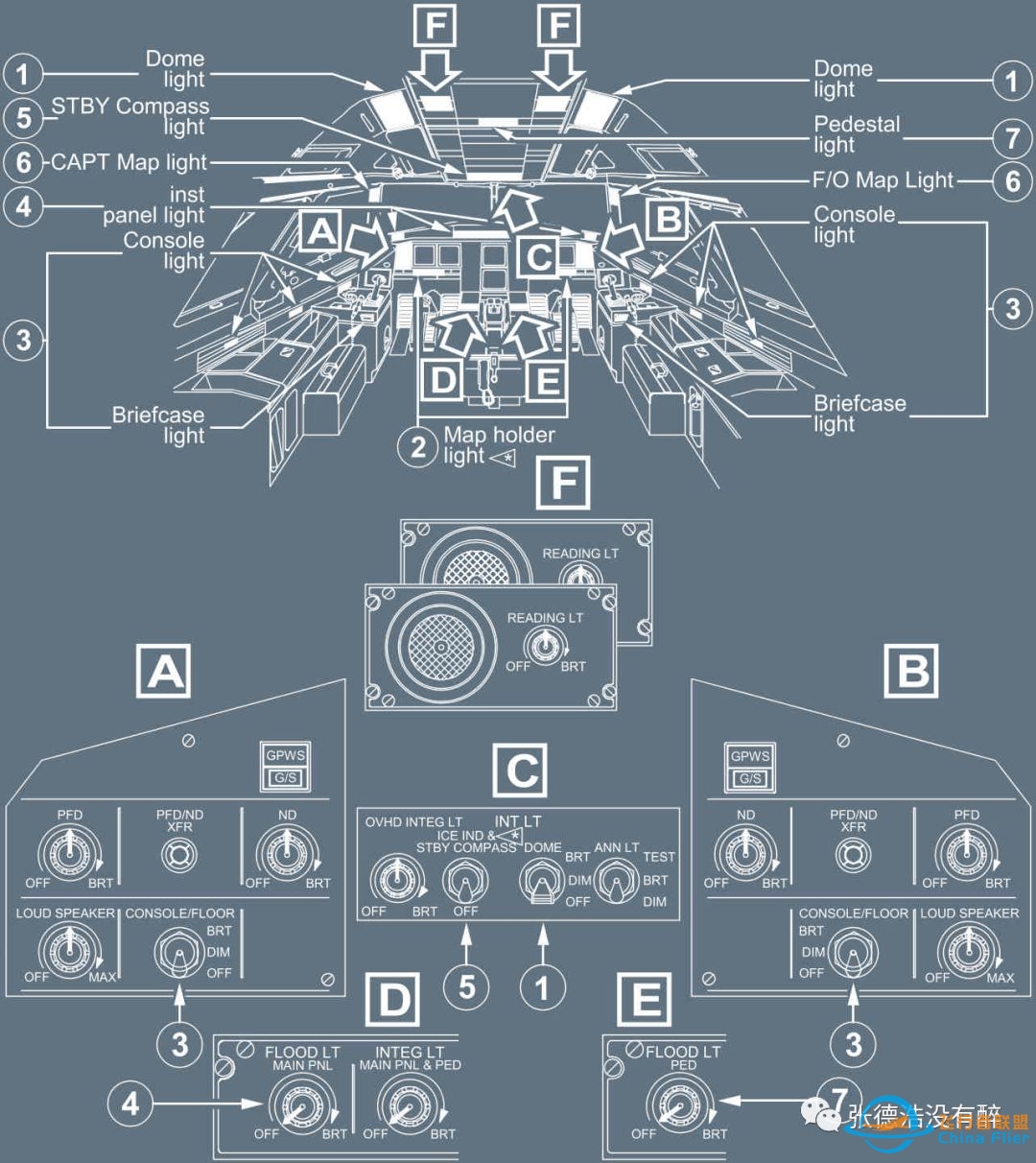
驾驶舱通风 CCOM/02-090 Cockpit Air Conditioning
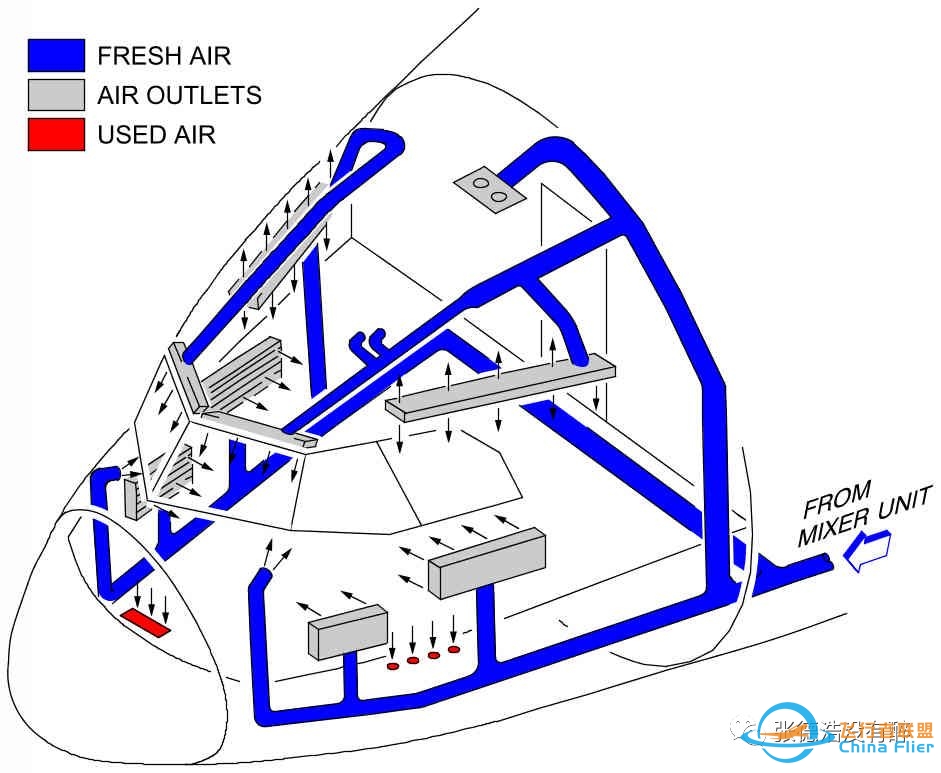
驾驶舱应急设备
FCOM/DSC-25-10 Flight Deck
FCOM/DSC-25-20 Emergency Equipment
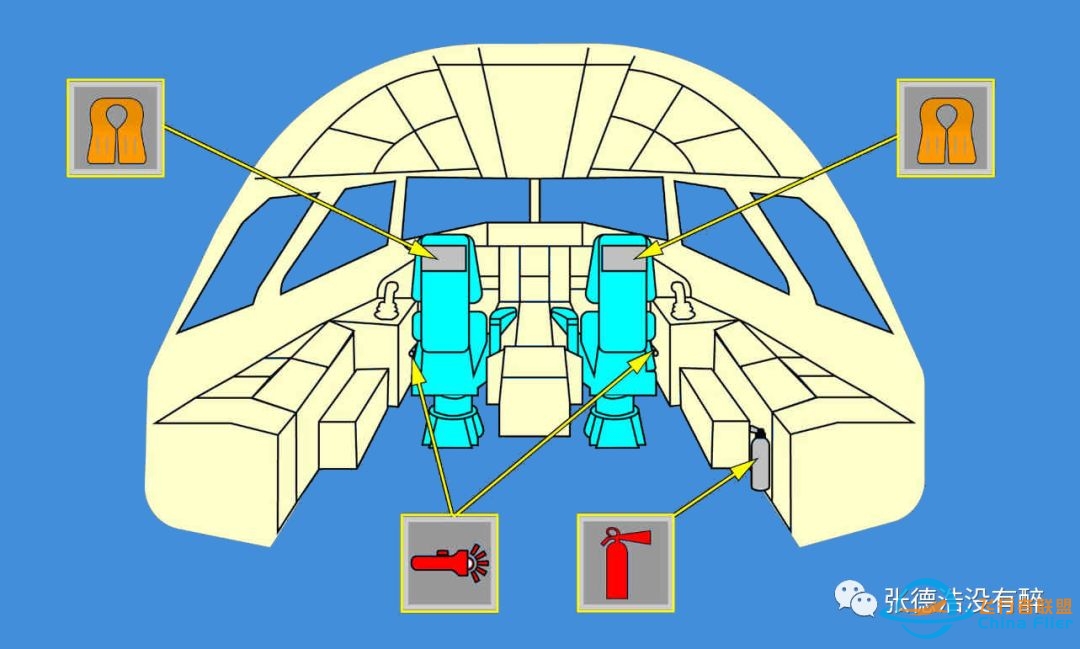
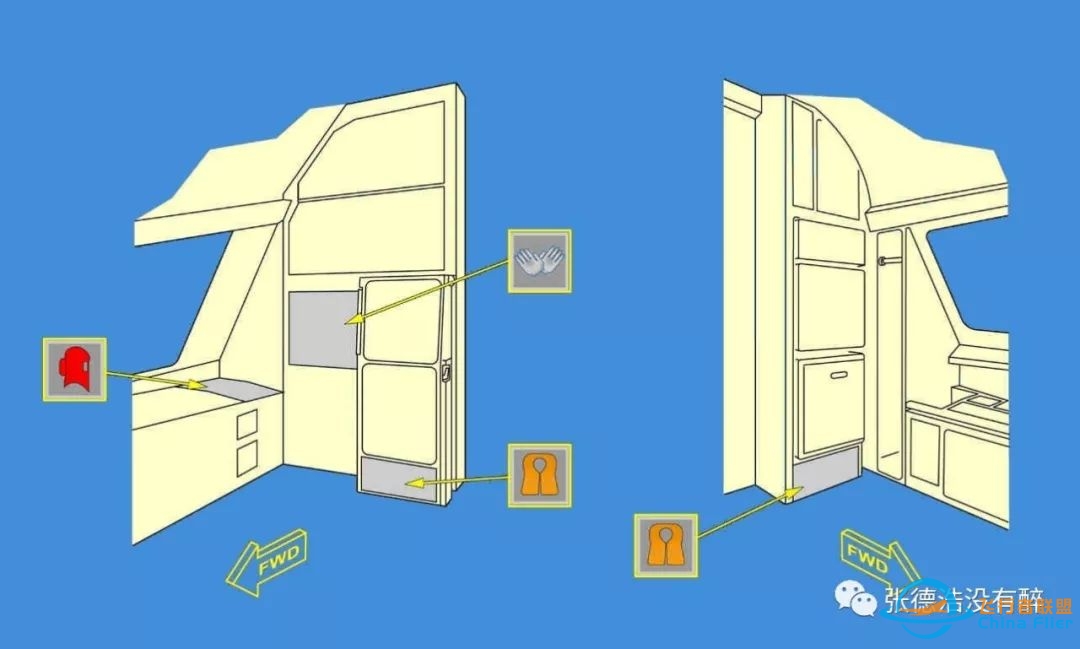
撤离绳 CCOM/05-020 Escape Rope
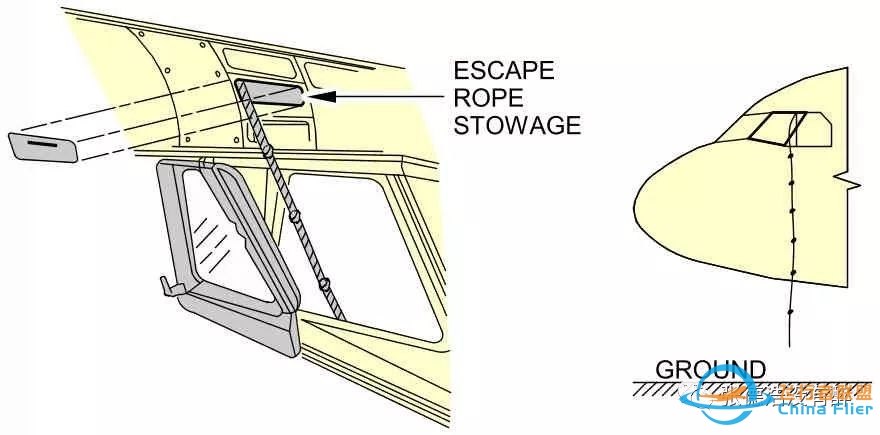
氧气 FCOM/DSC-35-20 Fixed Oxygen System for Cockpit
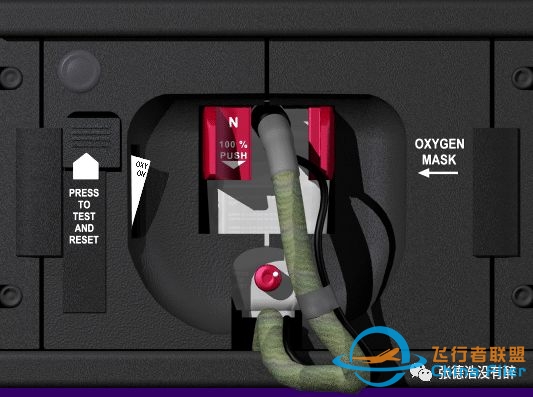
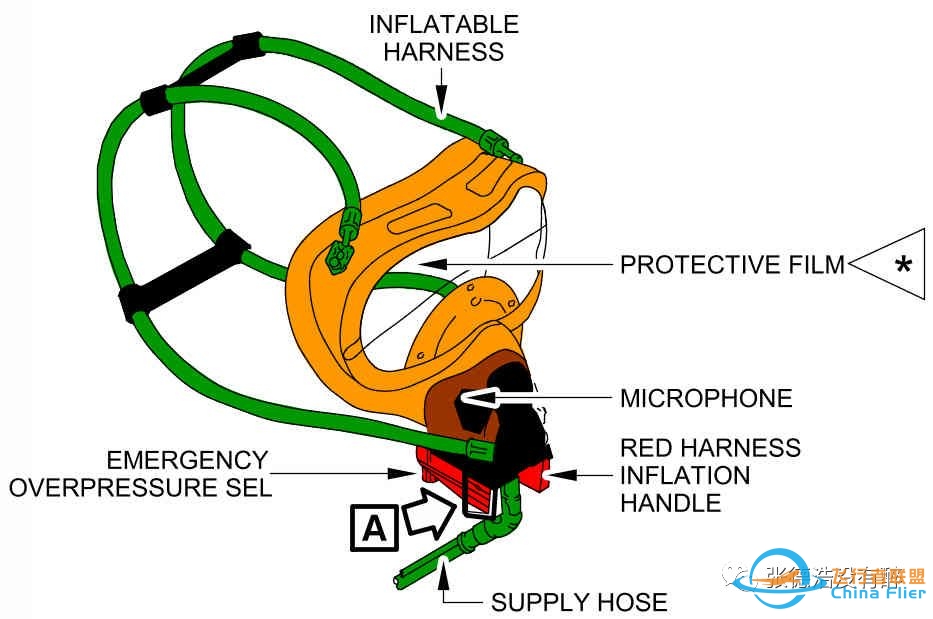
FCOM/PRO-NOR-SOP EMERGENCY EQUIPMENT
驾驶舱预先准备检查下列应急设备
‐ 救生衣存放
‐ Xxx stowed
‐ 防烟罩或PBE存放
‐ 便携灭火瓶保险在位/压力绿区
‐ 氧气面罩存放
‐ 应急手电筒存放
‐ 撤离绳存放
顶板信息索引(按SOP检查操作顺序)
风挡雨刷 WIPER 参考 FCOM/DSC-30-60-20 Rain Removal
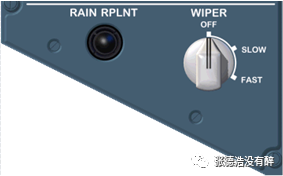
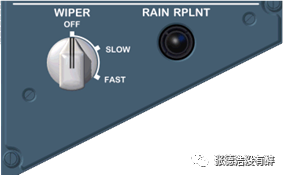
电源 ELEC 参考 FCOM/DSC-24-20 Electrical

火警 FIRE
参考 FCOM/DSC-26-20-20 Fire Protrction - Engines and APU
参考 FCOM/DSC-31-05-30 Attention - Getters

APU 参考 FCOM/DSC-49-20 APU

空调 AIR COND
参考 FCOM/DSC-21-10 Air Conditioning
参考 FCOM/DSC-36-20 Peneumatic
A320
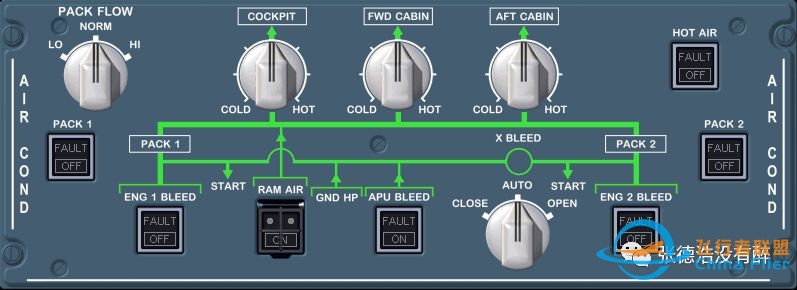
A321
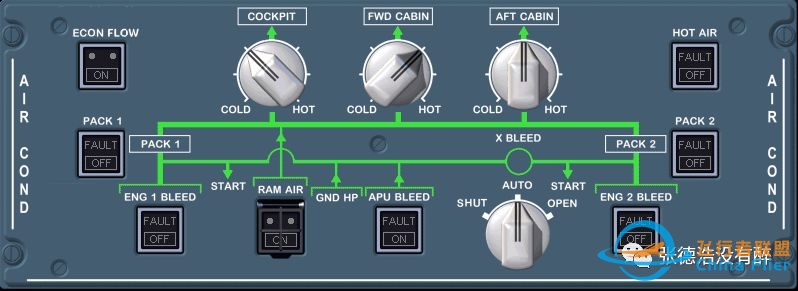
通风 Ventilation
参考 FCOM/DSC-21-30 Ventilation

货舱加温 CARGO HEAT (选装)
参考 FCOM/DSC-21-40 Cargo
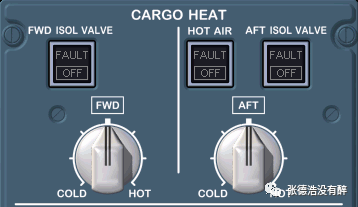
驾驶舱灯光 INT LT
参考 FCOM/DSC-33-10 Cockpit Lighting

舱音记录器 RCDR
参考 FCOM/DSC-23-10-40 Cockpit Voice Recorder
参考 FCOM/DSC-31-60-20 FLT Recorders

撤离 EVAC 参考
FCOM/DSC-23-40-10 Emergency Evacuation

ADIRS 参考 FCOM/DSC-34-NAV-10-20 ADIRS
经典款
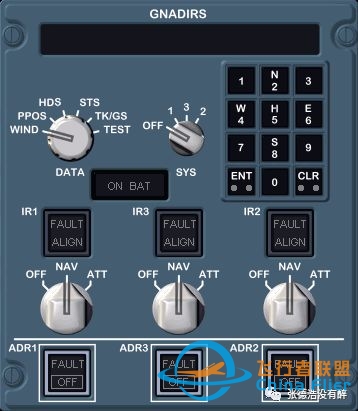
时尚款
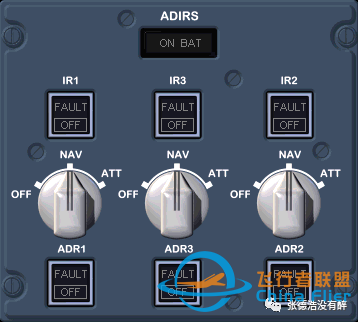
外部照明 EXT LT 参考 FCOM/DSC-33-20-20
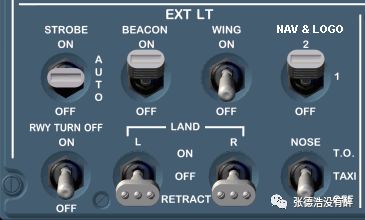
旅客通知 SIGNS
参考 FCOM/DSC-33-30-20 Emergency Lighting
参考 FCOM/DSC-33-40-10 Signs

机舱增压 CABIN PRESS
参考 FCOM/DSC-21-20-40 Pressurizition
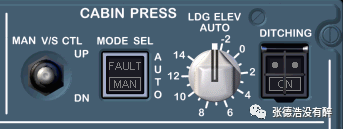
燃油 FUEL 参考 FCOM/DSC-28-20 Fuel
构型I

构型II

(部分新飞机加装额外中央油箱ACT)
音频转换 AUDIO SWITCHING
参考 FCOM-DSC-23-10-50 Audio Switching
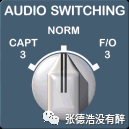
RMP 参考 FCOM/DSC-23-10-20 Radio Management Panel
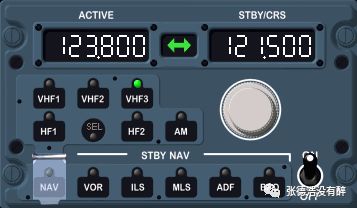
ACP 参考 FCOM/DSC-23-10-50 Audio Control Panel
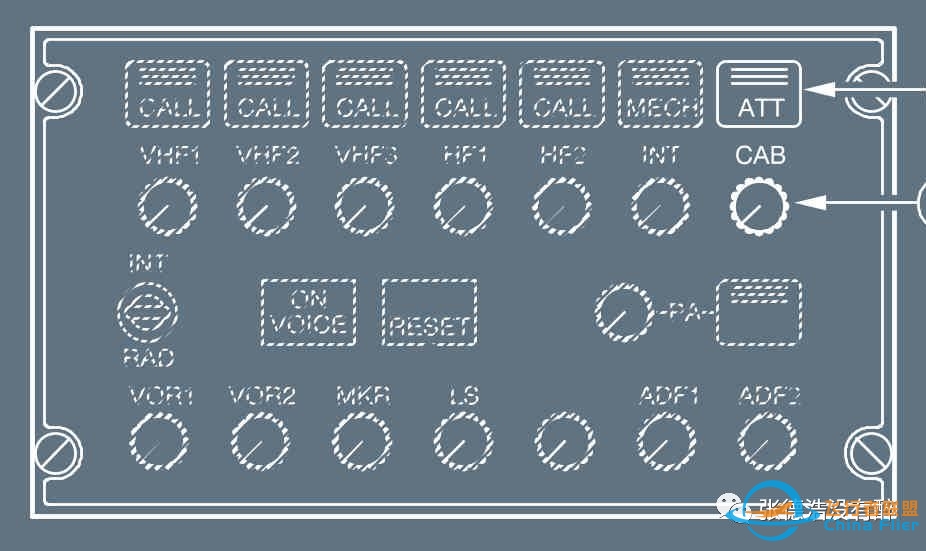
使用原理 FCTM/AOP-10-20-30
顶板的暗舱概念
每个按钮都有一盏或两盏灯:
‐ 上部表示告警或系统状态(e.g. FAULT light, OPEN light).

如果无需显示警告或系统状态,两个灰点取代灯的位置

‐ 下部对应于:
•在按钮电门上,对应系统控制的选项(e.g. ON, OFF, OVRD), or

•在按钮上,对应系统的状态(e.g. MAN).

如果无需显示系统控制的选项,两个灰点取代灯的位置。

一般的操作规则是:灯灭原理。系统准备好并适合飞行。
按钮/按钮电门灯
颜色编码的,表示系统的状态:
‐ Amber:
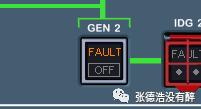
系统失效
‐ Red:

可能需要立即修正动作的失效
‐ Green:

系统工作正常
‐ Blue:

临时选择的系统工作正常
‐ White:

按钮的不正常位置或着维护/测试结果指示
‐ Blank 空的: 该系统适合飞行。
磁罗盘 FCOM/DSC-34-NAV-20 Compass
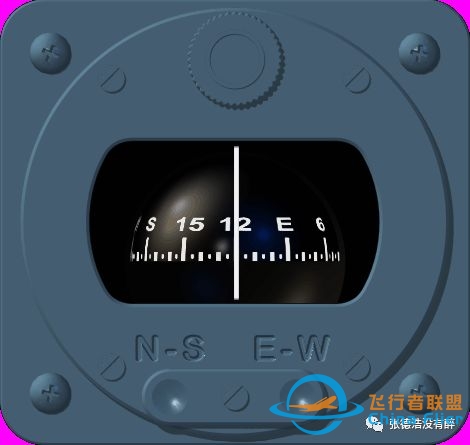
可收放的直读磁罗盘位于风挡以上中间位置
磁差牌置于磁罗盘之上
Note: 由于APU继电器在驾驶舱中的位置,APU起动过程可能干扰磁罗盘读数。
目视结冰指示器 FCOM/DSC-30-70-10 Visual Ice Indicator
An external visual ice indicator is installed between the two windshields. 位于机身外两风挡之间。
There can be also an external ice detector light 磁罗盘和结冰指示器灯光使用同一个顶板电门 参考 FCOM/DSC-33-10-30
遮光板
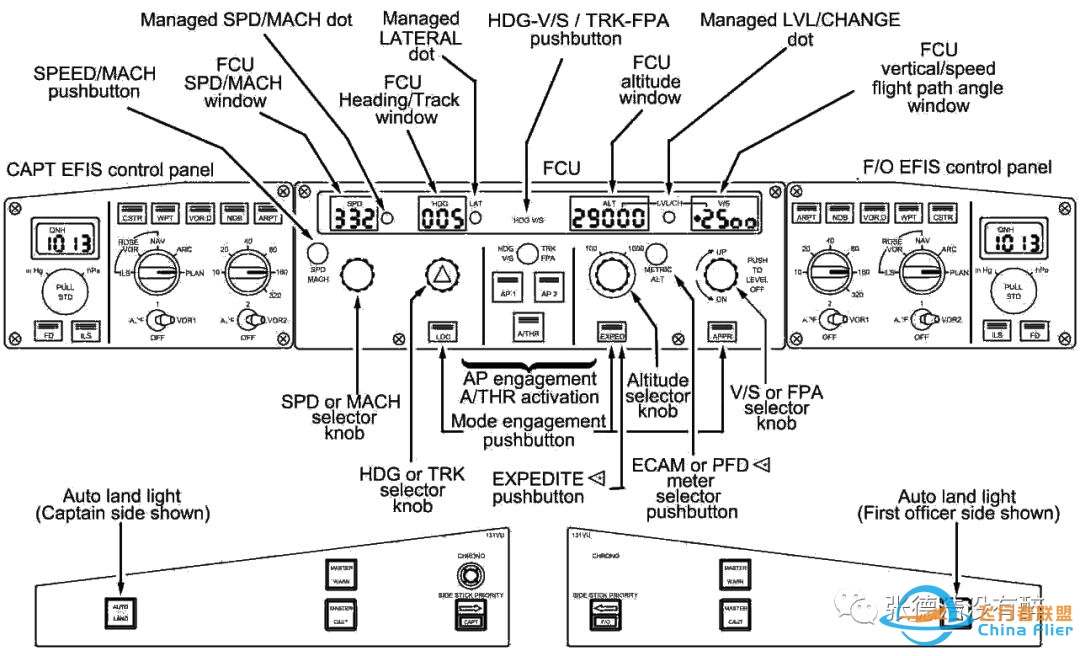
FCU 参考 FCOM/DSC-22_10-40-20 FCU
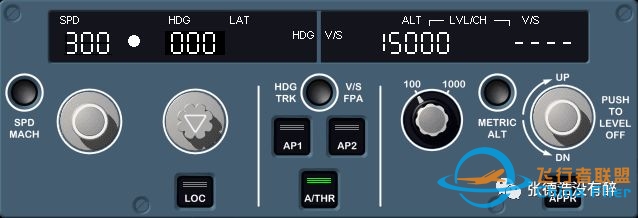
其它遮光板指示灯/电门
FCOM/DSC-31-50 EFIS Control Panel & Chronometer
FCOM/DSC-31-30 Attention Getters
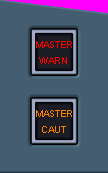
FCOM/DSC-27-20-30 SIDE STICK PRIORITY lt

FCOM/DSC-22_30-80-30-10 Autoland Warning Light
FCOM/DSC-46-10-40-10 ATC
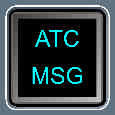
主仪表面板显示
PFD FCOM/DSC-22_10-40-40 Primary Flight Display
FCOM/DSC-31-40 Indications on PFD
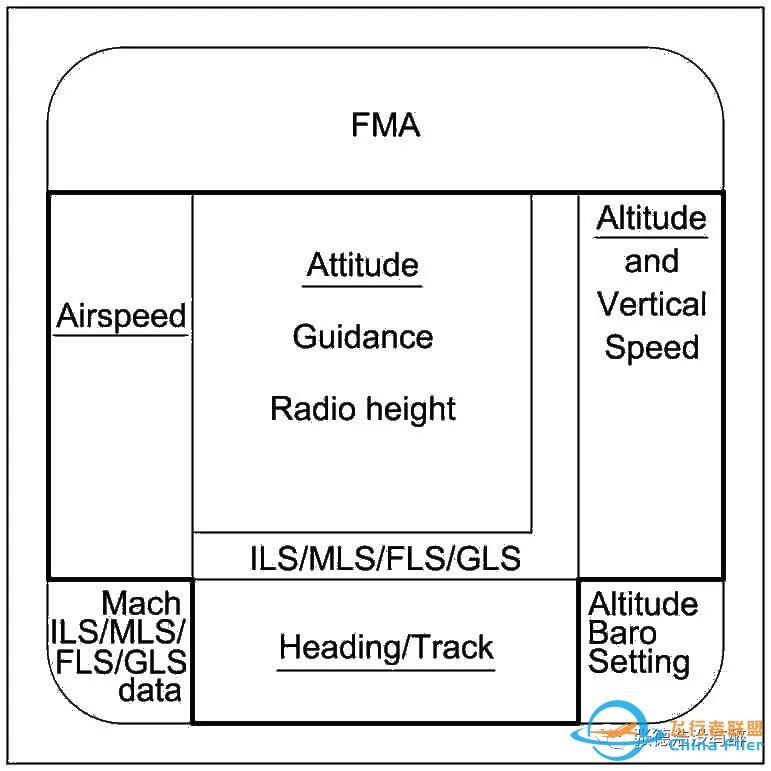
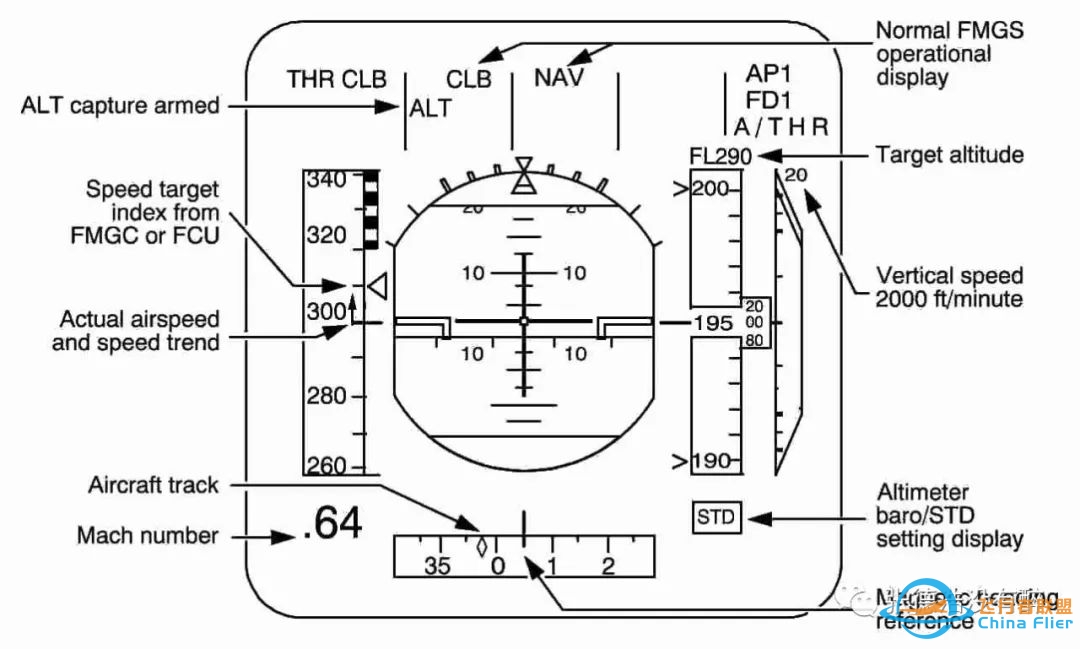
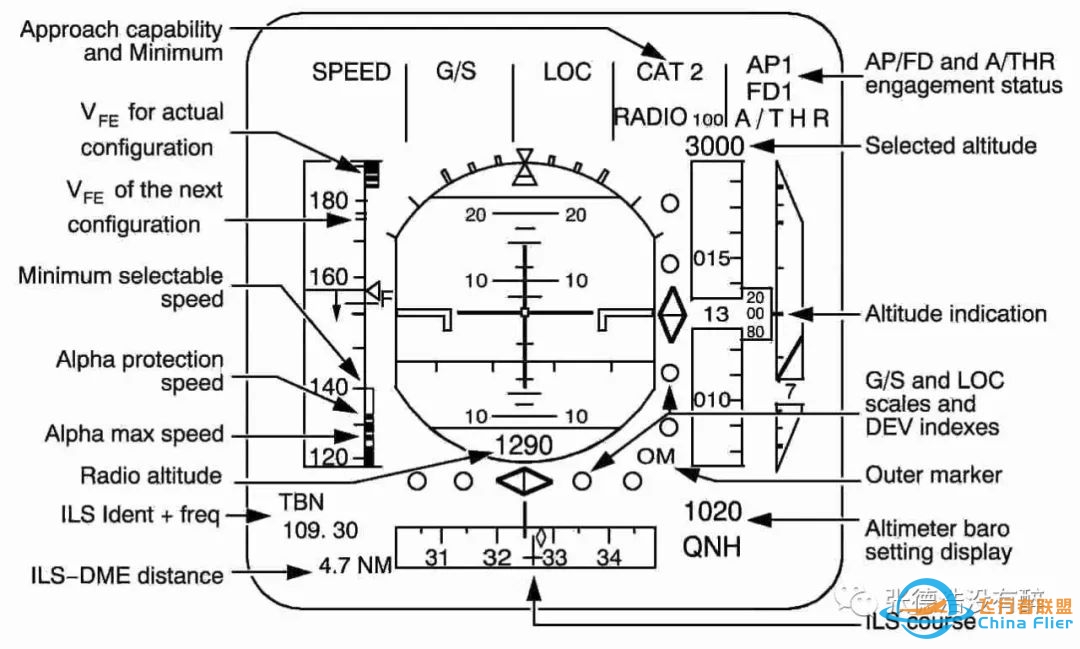
FMA 参考 FCOM/DSC-22_30-100 Flight Mode Annunciator
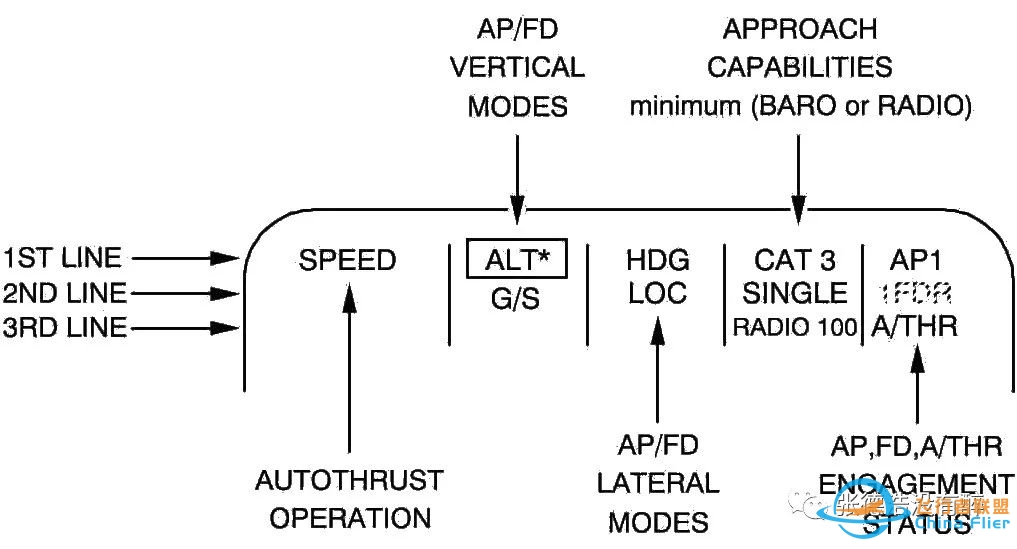
飞行方式信号牌位于PFD的顶部,显示自动推力的状态,AP/FD的垂直和水平方式,进近能力以及AP/FD/自动推力的接通状态。
新的信号牌出现外围会有白框显示10秒。某些模式转换情形下白框显示延长到15秒并伴有三下滴答声。
左边的三列
第一行以绿色显示接通的模式。
第二行以蓝色或洋红色显示预位的模式。
洋红色表示预位或接通的模式存在限制。
第三行显示特殊信息
‐ 飞行操纵相关的信息最优先
• 红色仅俯仰配平闪烁9秒后稳定
• 琥珀色使用人工俯仰配平闪烁9秒后稳定
‐ FMGS相关信息次优先
THE FOURTH COLUMN
以白色显示进近能力。
以蓝色显示最低高度。
注:FMA的气压或无线电数值不取整:输入在MCDU PERF APPR页面上的精确数值显示在FMA上。
THE FIFTH COLUMN 第五列
以白色显示AP,FD和自动推力的接通状态。
FMGC自动转换在FD外围显示10秒的框
当自动推力预位而没有激活以蓝色显示A/THR。
注:FMGS同步自动推力模式,AP/FD模式和进近能力在两部PFD上显示相同的信息。
中心区域
特定地面指示
参考 FCOM/DSC-17-20-30 Side Stick Indications On PFD
参考 FCOM/DSC-31-40 Specific Ground Indication
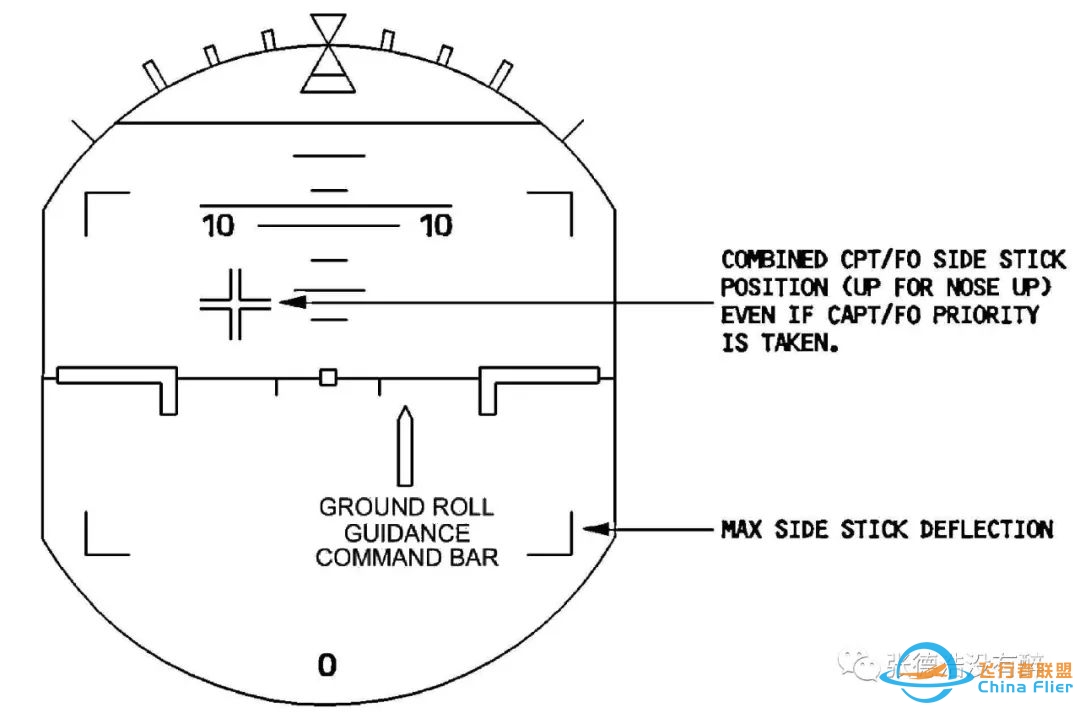
在地面,第一台发动机起动后,两部PFD上出现白色侧杆位置的指示。
飞机从地面到空中时,指示消失。
地面滑跑引导指令杆为绿色,如有航向信标台信号,飞机在地面或空中时低于无线电高度30ft,显示该符号。它显示飞行指引偏航指令,以保持飞机处于跑道中心线。
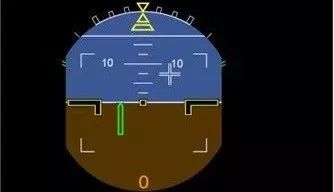
姿态信息
参考 FCOM/DSC-31-40 Attitude Data
参考 FCOM/DSC-22-30-20 Flight Director
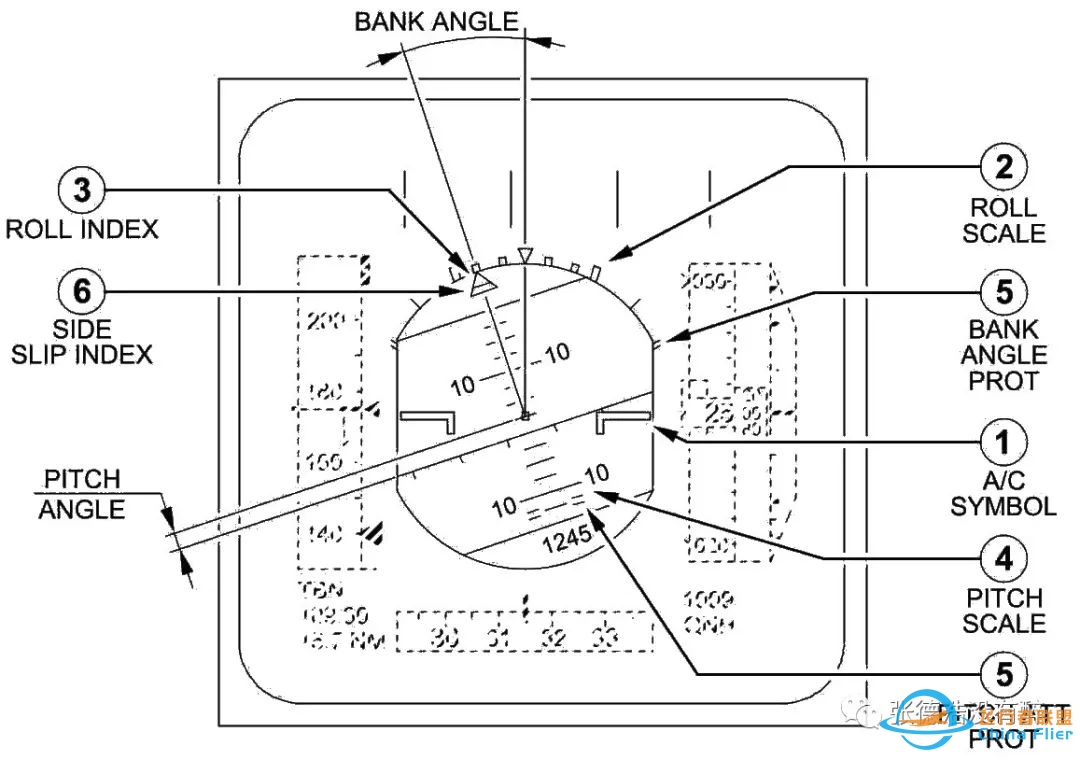
Fixed Aircraft Symbol 固定飞机符号
This symbol is in black, and outlined in yellow. The yellow outline is dimmed if the flight crew selects TRK-FPA, unless the FMA is in TOGA or FLX mode. 符号为黑色,边框是黄色,当飞行机组选择TRK-FPA黄色边框暗淡,除非FMA在TOGA或FLEX模式。
Roll Scale 横滚刻度
This scale is in white, and has markers at 0, 10, 20, 30, and 45 ° of bank.在坡度0, 10, 20, 30, 和45 °的位置标有白色的刻度。
Roll Index (yellow) 横滚指标
This pointer indicates the bank angle. When the bank angle exceeds 45 °, all the PFD symbols except those for attitude, speed, heading, altitude, and vertical speed, disappear. The display returns to normal when the bank angle decreases below 40 °. 此游标指示坡度。当坡度超过45 °,PFD上除姿态,速度,航向,高度和垂直速度以外的其它符号都消失。当坡度减小到低于40°时显示恢复正常。
Pitch Scale (white) 俯仰刻度
This scale has markers every 10 ° between 80 ° nose up and 80 ° nose down (every 2.5 ° between 10 ° nose down and 30 ° nose up). When pitch angle exceeds 25 ° nose up or 13 ° nose down, all the PFD displays except attitude, speed, speed trend, heading, altitude, and vertical speed disappear. Beyond 30 °, large red arrowheads indicate that the attitude has become excessive and show the direction to move the nose in order to reduce it. The display returns to normal when pitch angle becomes less than 22 ° nose up or 10 ° nose down. 在俯仰角±80°范围内每10°(30°抬头和10°低头范围中间是每2.5°)有个刻度。当俯仰角超出25°抬头或13°低头,PFD上除了姿态,速度,速度趋势,航向,高度和垂直速度以外的其它显示消失。超过30°,大红箭头表示姿态过量并指示移动机头的方向以减少幅度。当俯仰角少于22°抬头或10°低头显示恢复正常。
Flight Control Protection Symbols 飞行操纵保护符号
The display shows these symbols (=) in green:显示器以绿色呈现(=)符号
• On the roll scale to mark the bank angle protection availability. 在横滚刻度上标记坡度保护的可用区间。
• On the pitch scale at 15 ° nose down or 30 ° nose up to mark the pitch limits. 在俯仰刻度上位于15°抬头和30°低头以标记俯仰限制。
An amber x replaces these symbols if the corresponding protection is lost. 当失去对应的保护,琥珀色的x取代这些符号。
(参考 FCOM/DSC-27-20-10-20 Protections - General)
Sideslip Index (yellow) 侧滑指标
This trapezoidal index moves beneath the roll index. On ground, it represents the lateral acceleration of the aircraft. In flight, it shows sideslip (as computed by the FAC). One centimeter of displacement indicates 0.2 g. The sideslip index is against its stop at 0.3 g. 梯形指标在横滚指标底下移动。在地面上表示飞机的横向加速度,飞行中则指示侧滑(由FAC计算)。1厘米的偏移表示0.2 g。侧滑指标在0.3 g 达到量程极限。


In case of engine failure at takeoff or go around, the sideslip index changes from yellow to blue.在发动机失效的起飞和复飞时,侧滑指标由黄变蓝
In this case, the sideslip index is called β target. 在这种情况下,侧滑指标被称为 β 目标。
擦机尾俯仰限制指示
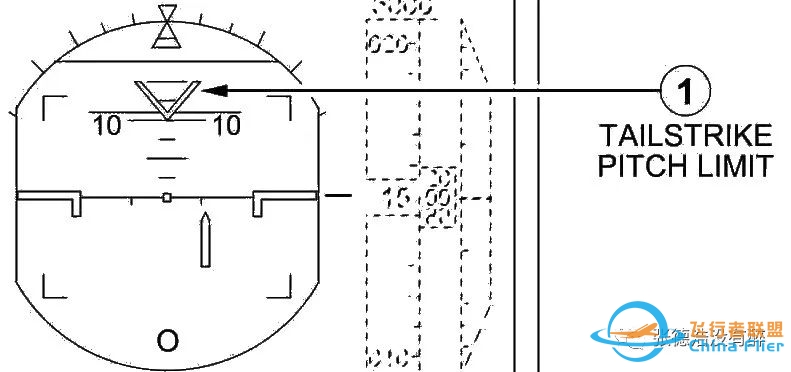
Tailstrike Pitch Limit 擦机尾俯仰限制
The pitch limit indicates the maximum pitch attitude to avoid the tailstrike risk at landing. 俯仰限制显示最大俯仰姿态以避免着陆擦机尾。The indication is a fixed value corresponding to the main landing gear compressed. 该指示固定显示主起落架压缩时的限制值。The indication appears at 400 ft radio height. The indication disappears, when there is no longer a risk of tailstrike. 该指示在无线电高度400 ft时出现直到不存在擦机尾风险后消失。
无线电高度
A value appears, when the aircraft is lower than 2 500 ft. 当飞机高度低于2500ft时显示无线电高度值。
‐ If a DH has been entered, the radio height appears: 输入过DH后,无线电高度在以下情况出现
• In green, when DH +100 ft < RA < 2 500 ft
• In amber, when RA < DH +100 ft
If “NO” is entered as the DH on the MCDU APPROACH page, 0 ft becomes a default value. 当MCDU APPROACH页面的DH输的是“NO”时,0 ft 成为默认值。
When the aircraft reaches the decision height selected on the MCDU, DHletters flash amber for 9 s, then remain amber above the radio height indication. 当飞机到达MCDU预选的决断高度,DH在无线电高度指示之上以琥珀色闪烁9秒后保持。
‐ If no DH has been entered, or if both FMGCs fail, the radio height appears:
如果没有输入DH或双FMGC失效,无线电高度以如下方式呈现
• In green, when 400 ft < RA < 2 500 ft
• In amber, when RA ≤ 400 ft
The radio height indication changes every 10 ft down to 50 ft, then every 5 ft down to 10 ft, then every foot. 无线电高度指示每10 ft变动一次至下降到50 ft,每5 ft变动一次至下降到10 ft,之下每英尺都变动。
飞行航径向量 Flight Path Vector
The Flight Path Vector (FPV) is the flight reference with the TRK and FPA as basic guidance parameters. 飞行航径向量(FPV)是以TRK和FPA为基本向导参数的飞行参考。
The FPV appears on the PFD as a symbol, known as the "bird". The bird indicates the track and flight patch angle in relation to the ground. PFD显示的FPV符号也叫“小鸟”。小鸟指示相对地面的航迹和飞行航径角。
The track is indicated on the PFD by a green diamond on the compass, in addition to the lateral movement of the bird in relation to the fixed aircraft symbol. PFD罗盘上的◇表示航迹,随着小鸟相对固定飞机符号的水平运动。On the ND, the track is indicated by agreen diamond on the compass scale. ND罗盘刻度上的◇表示航迹。The difference in angle between track and heading indicates the drift. 航迹和航向之差表示偏流。
The flight path angle is indicated on the PFD by the vertical movement of the bird in relation to the pitch scale. PFD上小鸟相对垂直刻度的移动表示飞行航径角。
With the flight directors (FD) ON, the Flight Path Director (FPD) replaces the HDG-VS Flight Director (FD). With both FD pb set to OFF, the blue track indexappears on the PFD horizon. 当飞行指引(FD)接通时,飞行航径指引(FPD)取代HDS-VS飞行指引(FD)。当两个FD按钮都位于OFF,蓝色的航径指标显示在PFD地面线上。
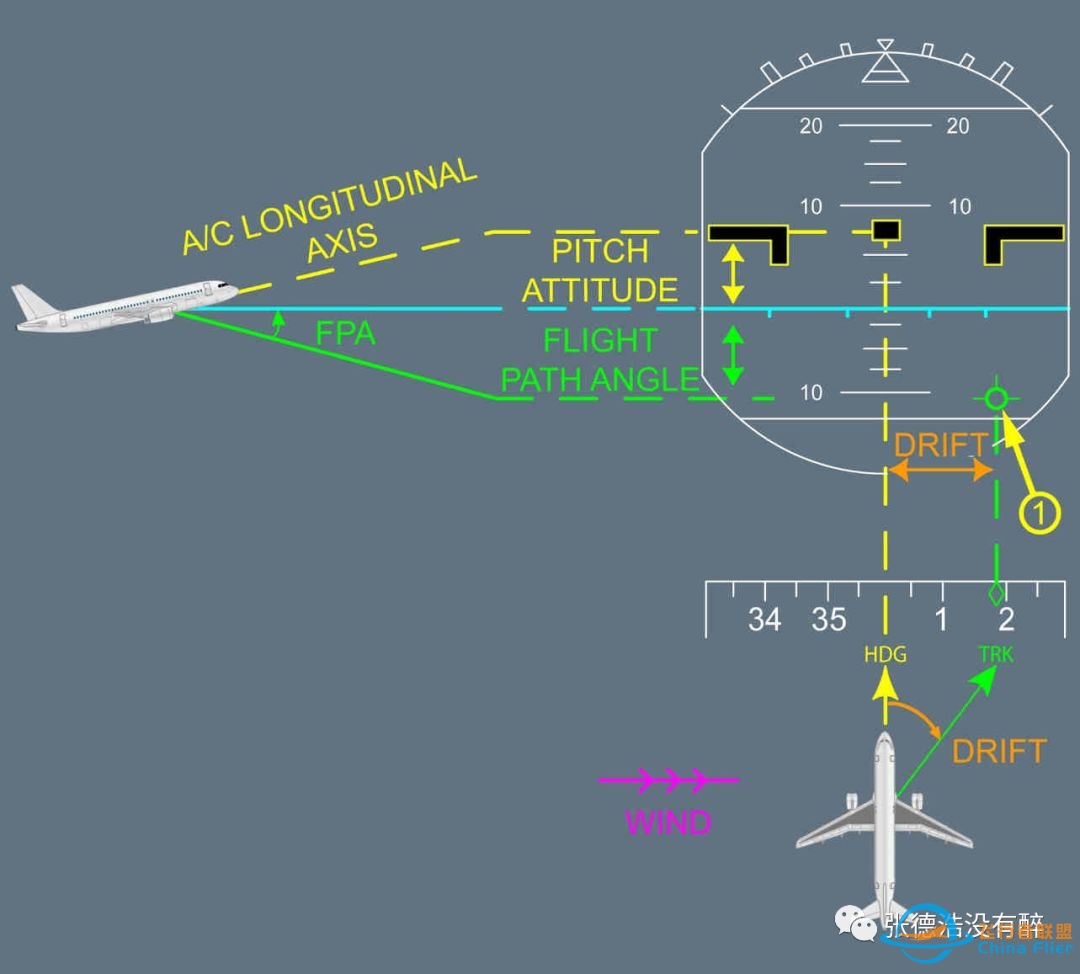
The bird is the flying reference that should be used when flying a stabilized segment of trajectory, In dynamic manoeuvres, the bird is directly affected by the aircraft inertia and has a delayed reaction. As a result, the bird should not be used as a flight reference in dynamic manoeuvres. 小鸟应该被用于在稳定航段上作为飞行参考,比如非精密进近或目视起落。在做机动时小鸟直接受飞机惯性的影响有延迟效应,所以小鸟不应作为机动飞行时的参考。
FCTM/AS-BIRD
The attitude flight reference should be used for dynamic manoeuvres, for example, take-off or go-around. An action on the sidestick has an immediate effect on the aircraft attitude. The flight crew can monitor this flight reference directly and accurately during these manoeuvres. 姿态飞行基准应用于动态机动飞行,比如,起飞或复飞。侧杆上的一个动作会立刻对飞机姿态产生影响。飞行机组在这些机动飞行中能够直接并准确地监控飞行基准。
RELIABILITY 可靠性
The FPV is computed from IRS data, therefore, it is affected by ADIRS errors. An error may be indicated by a small track error, usually of up to ± 2 °. This can be easily determined during the approach.
因为飞行轨迹矢量(FPV)由IRS数据计算,因此它会受到ADIRS误差的影响。这种误差可由小的航迹误差指示,通常最大为±2°。在进近阶段可比较容易确定。
The FPV is also computed from static pressure information. Therefore, the bird must be considered as not reliable, if altitude information is not reliable.
FPV计算还使用静压信息。因此,如果(气压)高度信息不可靠,那么小鸟必须被认为是不可靠的
PRACTICAL USE OF THE BIRD 小鸟的实际使用
一般规则
When using the "bird", the flight crew should first change attitude, and then check the result with reference to the "bird".
当使用“小鸟”时,首先飞行机组应改变姿态,然后参考“小鸟”来检查结果。
WINDSHEAR 风切变
FCOM/DSC-22_40-40 Windshear Detection Function
【记忆项目】FCOM/PRO-ABN-SURV [MEM] WINDSHEAR
The windshear detection function is provided by the Flight Augmentation Computer (FAC) in takeoff and approach phase in the following conditions: 风切变探测由FAC提供,在以下情况
‐ At takeoff, 3 s after liftoff, up to 1 300 ft RA
‐ At landing, from 1 300 ft RA to 50 ft RA
‐ With at least CONF 1 selected.
The warning consists of:
‐ A visual “WINDSHEAR” red message displayed on both PFDs for a minimum of 15 s. PFD显示“WINDSHEAR”至少15秒
‐ An aural synthetic voice announcing “WINDSHEAR” three times. 合成音响“WINDSHEAR”三次
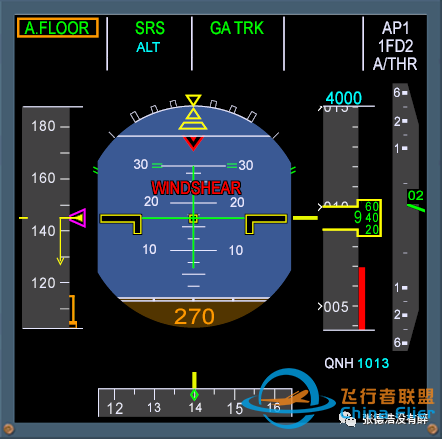
W/S AHEAD前方风切变
FCOM/DSC-34-SURV-30-30 Predictive Windshear System
【记忆项目】FCOM/PRO-ABN-SURV [MEM] WINDSHEAR AHEAD
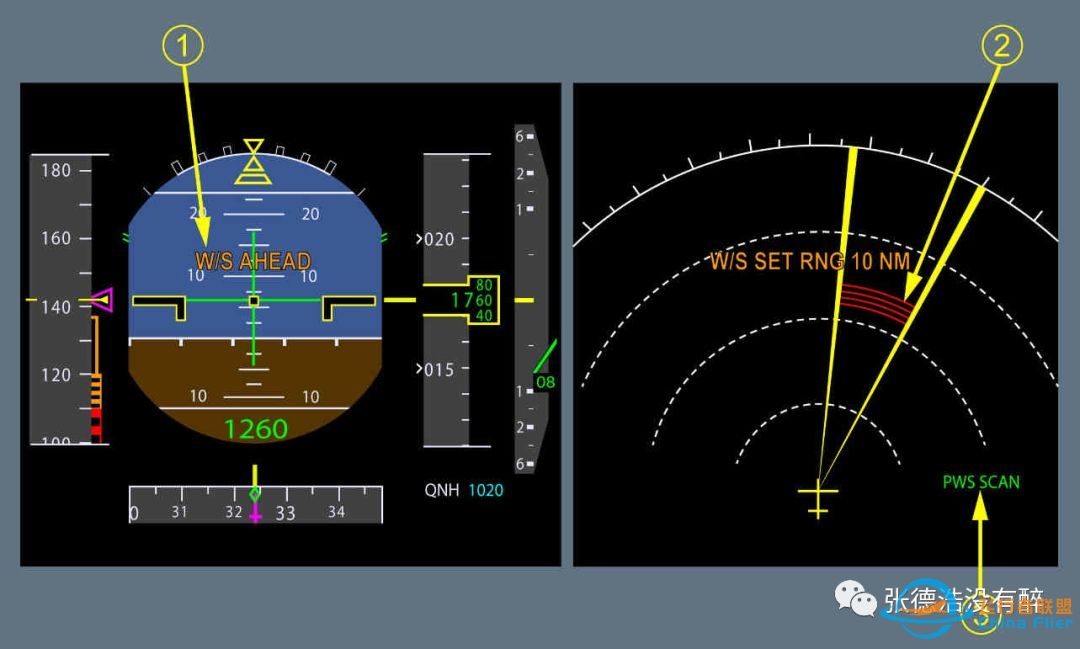
W/S AHEAD message on the PFD
This message is displayed, when the Predictive WindShear system detects windshear ahead of the aircraft. 预测式风切变系统探测飞机前方的风切变,根据警告级别在PFD显示琥珀色或红色的“W/S AHEAD”
The message is in amber or red, depending on the level of the alert.
Predictive WindShear area indication
PWS SCAN message on the ND
空速 Airspeed
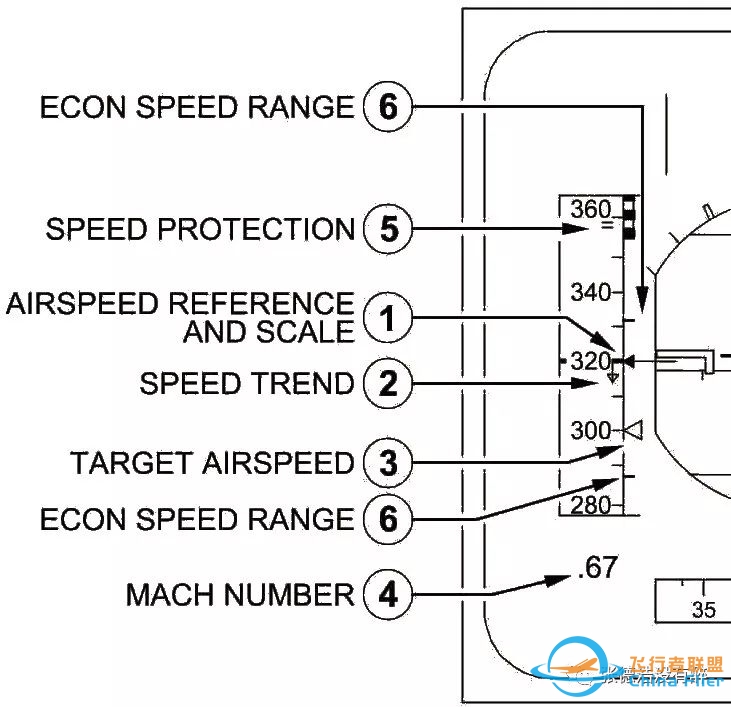
Actual Airspeed Reference Line and Scale 实际空速基准线及刻度
A white scale, on a grey background, moves in front of a fixed yellow reference line (next to a yellow triangle) to indicate airspeed. The minimum airspeed indication is 30 kt. 最小的空速指示是30 kt。
Speed Trend (yellow) 速度趋势
This pointer starts at the speed symbol. The tip indicates the speed the aircraft will reach in 10 s, if its acceleration remains constant. 速度变化稳定时,箭头指示空速在10秒后将要达到的位置。
It also disappears, if the FACs fail. 当FAC失效也会消失。
Target Airspeed (magenta or blue) 目标速度
This symbol gives the target airspeed, or the airspeed corresponding to the target Mach number. 目标空速或目标马赫数对应的空速。
The target airspeed is the airspeed computed by FMGC in managed speed mode (magenta), or the airspeed manually entered on the FCU in selected speed mode (blue). The target speed is indicated by a magentaor blue triangle.FMGC计算的管理速度,或FCU上手动选择的目标速度,以洋红色或者蓝色三角表示。
When the target speed is off the speed scale, its value is displayed as numbers, either above or below the speed scale.当目标速度超出速度刻度以数字显示在速度刻度顶上或底下。
Mach Number (green) 马赫数
It is displayed, when it is greater than0.5. 当马赫数大于0.5时显示
Speed Protection (green) 速度保护
This symbol indicates the speed (VMO +6 kt or MMO +0.01) at which overspeed protection becomes active
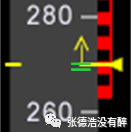
(Refer to DSC-27-20-10-20 Protections - General). Note: The ECAM displays an "O/SPEED" warning at VMO + 4 kt and MMO + 0.006.
ECON Speed Range (magenta) 经济速度范围
In descent mode with the ECON/AUTO SPD mode active, these two thick lines replace the selected speed symbol. It shows the upper and lower limits, calculated by the FMGC. 由FMGC计算,以两条粗线显示上下限制,在DES模式并且ECON.AUTO SPD模式激活时取代选择速度的符号。
‐ The upper speed is target speed +20kt, limited to VMAX or VMO -3 kt or MMO -0.006, whichever is lowest. 上限是目标速度+20 kt,限制在在VMAX,VMO-3kt或MMO-0.006三者中的最低值之下。
If a speed limit or a speed constraint applies, the upper margin is limited to ECON SPD +5 kt. 如果存在速度限制(limit飞机气动限制,constraint飞行程序限制,自己领会)上限是ECON SPD +5kt。
‐ The lower speed margin is the target speed -20 kt, limited to green dot, F, S, or VLS, whichever is higher. 下限是目标速度 -20kt,限制在绿点速度,F,S,或最小可选速度四者最高值以上。
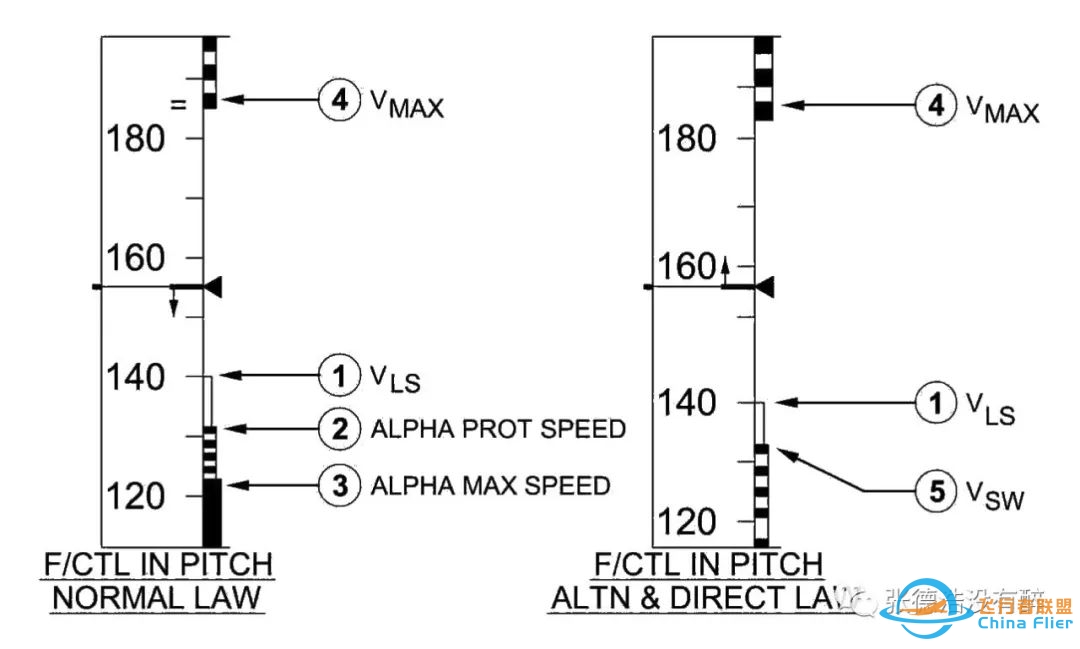
Minimum Selectable Speed (VLS) 最小可选速度
The top of the amber strip along the speed scale indicates this speed. It represents the lowest selectable speed providing an appropriate margin to the stall speed. 最小可选速度在失速速度之上提供适当的余度(Refer to DSC-27-20-10-20 Protections - High Speed Protection)
VLS information is inhibited from touchdown until 10 s after liftoff. VLS信息在接地以后到离地10内被抑制。
Alpha Protection Speed 迎角保护速度
The top of a black and amber strip along the speed scale indicates this speed. It represents the speed corresponding to the angle of attack at which alpha protection becomes active 表示α保护被激活时的迎角所对应的空速(Refer to DSC-27-20-10-20 Protections - General).
It is displayed when in pitch normal law. 俯仰正常法则下显示。
Alpha MAX Speed 最大迎角速度
The top of a red strip along the speed scale indicates this speed. It represents the speed corresponding to the maximum angle of attack that the aircraft can attain in pitch normal law 表示飞机在俯仰正常法则下所能达到的最大迎角对应的空速(Refer to DSC-27-20-10-20 Protections - General).
It is displayed when in pitch normal law. 俯仰正常法则下显示。
VMAX 最大速度
The lower end of a red and black strip along the speed scale defines this speed.
It is the lowest of the following: 以下的最低值
‐ VMO or the speed corresponding to MMO
‐ VLE
‐ VFE
(Refer to DSC-27-20-10-20 Protections - High Speed Protection)
Stall Warning Speed (VSW) 失速警告速度
The top of a red and black strip along the speed scale defines this speed.
It is the speed corresponding to the stall warning. 失速警告对应的空速(Refer to DSC-27-20-10-20 Protections - General).
VSW information is inhibited from touchdown until 5 s after liftoff. VSW在接地以后到离地五秒内被抑制。
It is displayed when operating in pitch alternate or pitch direct law. 在俯仰备用法则或俯仰直接法则下显示。
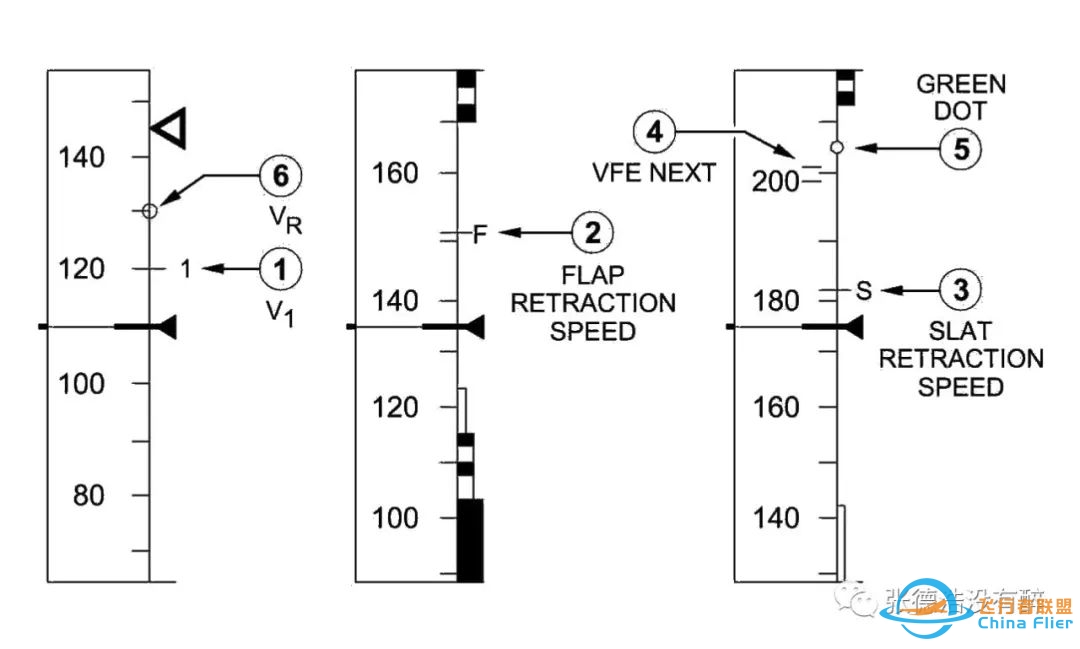
Decision Speed (V1) 决断速度
This is a blue symbol (numeral one) that the crew manually inserts via the MCDU. When it is off the scale, the upper part of the scale shows it in numbers. 机组在MCDU手动输入,速度带符号为数字1 ,超出空速带刻度则以数字显示在顶上。
It disappears after liftoff 离地后消失(Refer to DSC-22_10-50-50 Other Speeds).
Minimum Flap Retraction Speed 最小收襟翼速度
This is a green symbol (letter F).
It appears when the flap selector is in position 3 or 2. 当襟翼手柄位于3或2出现(Refer to DSC-27-20-10-20 Protections - High Speed Protection).
Minimum Slat Retraction Speed 最小收缝翼速度
This is a green symbol (letter S).
It appears when the flap selector is in position 1. 当襟翼手柄位于1时出现(Refer to DSC-27-20-10-20 Protections - High Speed Protection).
VFE NEXT 下一档襟翼最大速度
The VFE next symbol is an amber equal sign showing the VFE corresponding to the next flap lever position. = 表示VFE最大襟翼速度,对应下一档襟翼手柄位置
It appears when the aircraft altitude is below 15 000 ft or 20 000 ft, depending upon the FAC standard 在20000ft出现(Refer to DSC-22_10-50-30 Limit Speeds).
Green Dot (Engine-out operating speed in clean configuration) 绿点(光洁形态单发操作速度)
This green dot appears, when the aircraft is flying in the clean configuration. 光洁形态下出现○It shows the speed corresponding to the best lift-to-drag ratio. 表示最佳升阻比对应的空速。
Rotation speed: (VR) 抬轮速度
VR is entered on the PERF takeoff page of the MCDU, and is indicated by a cyan circle. MCDU的PERF takeoff页面输入VR,由○表示。
This cyan circle is visible during takeoff. ○起飞时可见
Note: V2 is represented by the target speed index during takeoff. V2代表起飞时的目标速度指标。
V2 is manually inserted by the crew via the MCDU. V2由机组在MCDU上手工输入。
【记忆项目】不可靠空速指示 PRO-ABN-NAV [MEM] UNRELIABLE SPEED INDICATION
高度 Altitude
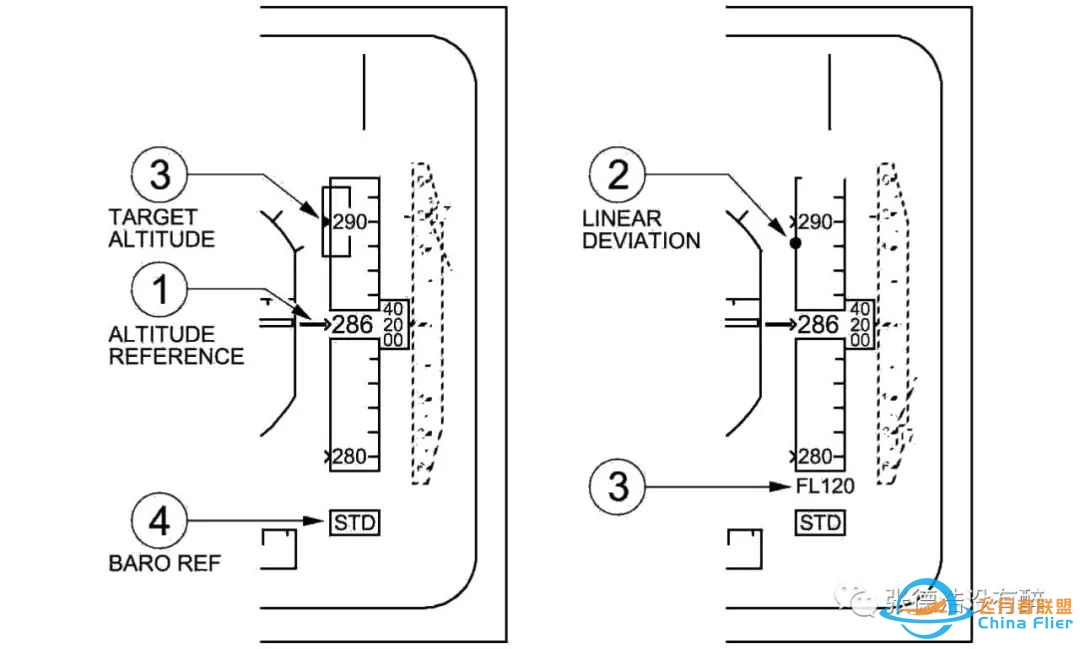
Altitude Indication 高度指示
This appears both as a white moving scale, and as a green digital readout on a grey background. Small white marks are positioned on the scale against the round values (e.g. 280, 290...). “NEG” appears in the window in white for negative values. The altitude window changes from yellow to amber, if the aircraft deviates from the FCU-selected altitude or flight
level. 当飞机偏离FCU上选择的高度或高度层,高度窗由黄色变为琥珀色
On any approach for which an minimum is entered in the FMGS, the altitude numbers change from green to amber, when the aircraft goes below the minimum. 在FMGS输入minimum后当飞机下降通过该数值高度数字由绿色变为琥珀色。
Linear Deviation (green filled circle)
This symbol appears next to the altitude corresponding to the theoretical vertical profile computed by the FMGC. It is displayed from the top of descent down to the MAP altitude. FMGC计算的理论垂直剖面对应的高度以●符号呈现。从下降顶点之下到复飞点高度该符号都显示。
Target Altitude or Selected Flight Level Symbol (blue)目标高度或选择高度层符号
This symbol shows the FCU selected altitude (if QNH or QFE BARO reference is selected) or the selected flight level (if STD BARO reference is selected.)
When the FMGC operates in the vertical managed mode, this symbol is magenta if it represents a flight plan altitude constraint that the FMGC will follow. If the target altitude or flight level is on the scale, the symbol is displayed and the numerical value appears inside the symbol. 垂直管理方式当存在高度限制,符号为洋红色。
If it is off the scale, the symbol is not displayed, and the numerical value appears above or underneath the scale. 超出刻度范围,符号以数值显示在刻度带顶上或底下。
Barometric Reference 气压基准
The display shows “STD” or it shows “QNH” or "QFE" and the numerical setting in hectoPascals or inches of mercury.
It pulses when the selection made by the flight crew is not correct (STD not selected above transition altitude in climb or STD still selected in approach below transition level). 过渡高度以上未选STD或过渡高度层以下仍选STD会闪烁。
Metric Altitude Indication 米制高度显示
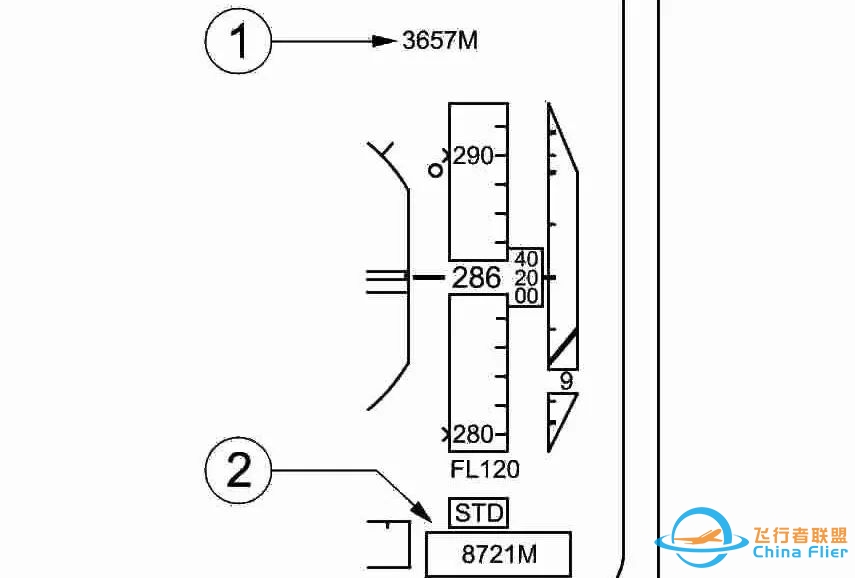
Target altitude or selected flight level (magenta or blue)meters.米制显示所选高度
Altitude indication (green) in meters. 米制显示飞机当前实际高度
进近Minimum指示
Approach minimum is displayed on the altitude scale by an amber indication.在高度刻度上以琥珀色指示。
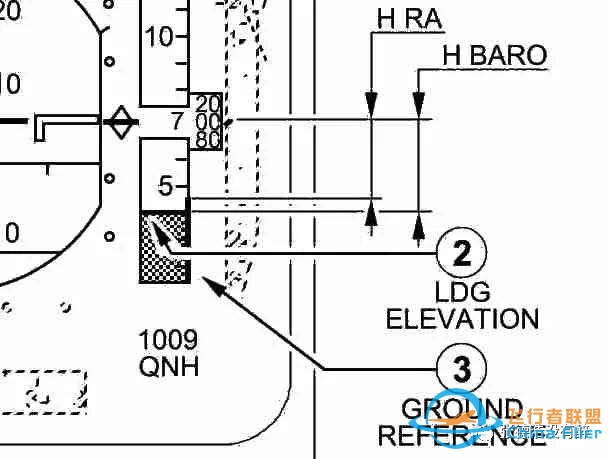
Radio Height 无线电高度
Landing Elevation (brown) 着陆标高
The top of the brown surface on the altitude scale represents the landing elevation at the flight-planned destination. 棕色区域的顶端在高度表刻度上表示飞行计划目的地机场着陆标高。
It is displayed:
‐ during flight phases 7 and 8 and
‐ if the STD reference mode is not selected. 没有选择STD模式
Ground reference 地面基准
A red ribbon on the right of the altitude scale represents the field elevation. This ribbon, which is driven by the radio altimeter signal, is displayed below 570 ft. 高度刻度右边的红带表示无线电高度表对应的机场标高,在570ft以下显示。
垂直速度 Vertical Speed
The displayed vertical speed information is normally based on both inertial and barometric data. 垂直速度显示基于惯性和气压数据合成。If inertial data is not available, it is automatically replaced by barometric information. 当惯性数据不可用,自动由气压信息代替。
In this case, the window around the numerical value becomes amber.这种情况包围数值的窗口显示琥珀色。
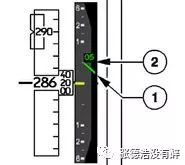
Analog pointer 模拟指针
This pointer, which is normally in green, points to a white vertical speed scale, displayed on a grey background
Digital indication 数字指示
This number, normally in green, is the vertical speed in hundreds of feet per minute. 数字单位是100ft/min。It disappears, if the vertical speed is less than 200 ft/min. 垂直速度小于200ft/min时消失
The analog pointer and the digital indication become amber, if:
• V/S is greater than 6 000 ft/min, (climb or descent)
• V/S is greater than 2 000 ft/min, during descent when 1 000 ft < RA < 2 500 ft, or
• V/S is greater than 1 200 ft/min, during descent and RA < 1 000 ft.
TCAS RA FCOM/DSC-34-SURV-60-20
FCOM/PRO-ABN-SURV [MEM] TCAS WARNINGS

Red area 红区
Indicates the vertical speed range, when there is a high risk of conflict. 冲突风险高的垂直速度区间
Green area 绿区
Indicates the recommended vertical speed range. It is wider than the red area. 推荐的垂直速度区间,比红区要宽
TCAS message
Appears in amber provided that the TCAS is not in standby, when the TCAS cannot deliver RA data, or in case of an internal TCAS failure. TCAS无法提供RA信息或内部失效,显示“TCAS”
航向 Heading
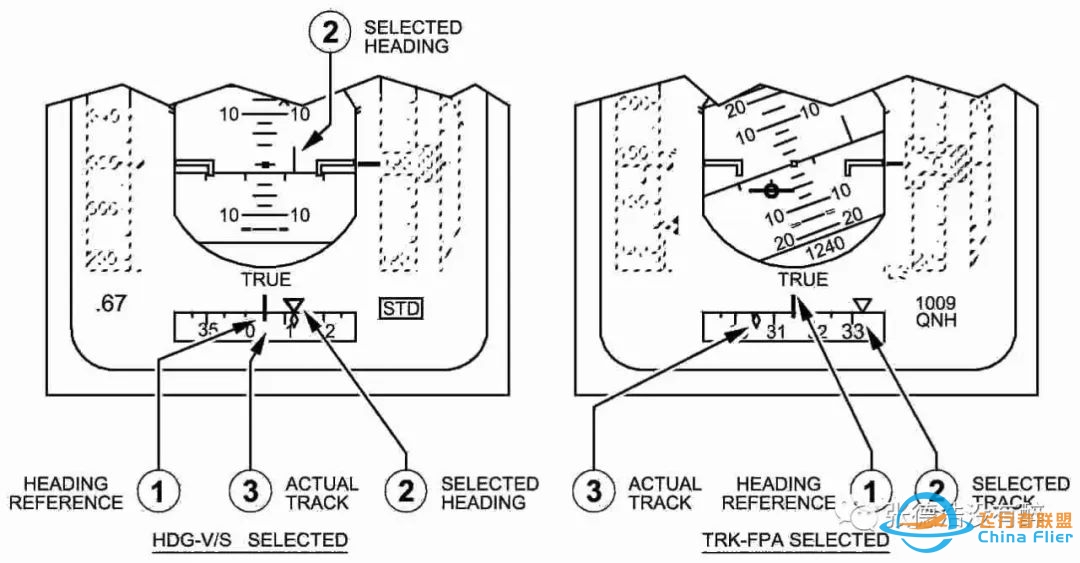
Heading Reference Line and Scale
A white scale on a grey background moves in front of a fixed yellow reference line to indicate the actual magnetic heading. 通常指示实际的磁航向
“TRUE” appears, when the display indicates the true heading, rather than the magnetic heading (latitude above 73 ° North or below 60 ° South). 当出现“TRUE”则显示真航向。
Selected Heading or Track Index (blue)
This pointer is in blue, and indicates the heading or track displayed on the FCU HDG-TRK window. 同步显示FCU HDG-TRK窗口。
If the FD pushbutton is OFF, a second heading/track symbol appears on the horizon line, and markers are displayed every 10 °. 当FD按钮处于OFF,第二个航向/航迹符号出现在地平线上,每10°显示一个标记。
Actual Track Symbol 实际航迹符号
This symbol is a small green diamond. 标志是◇
PFD显示的故障旗和信息
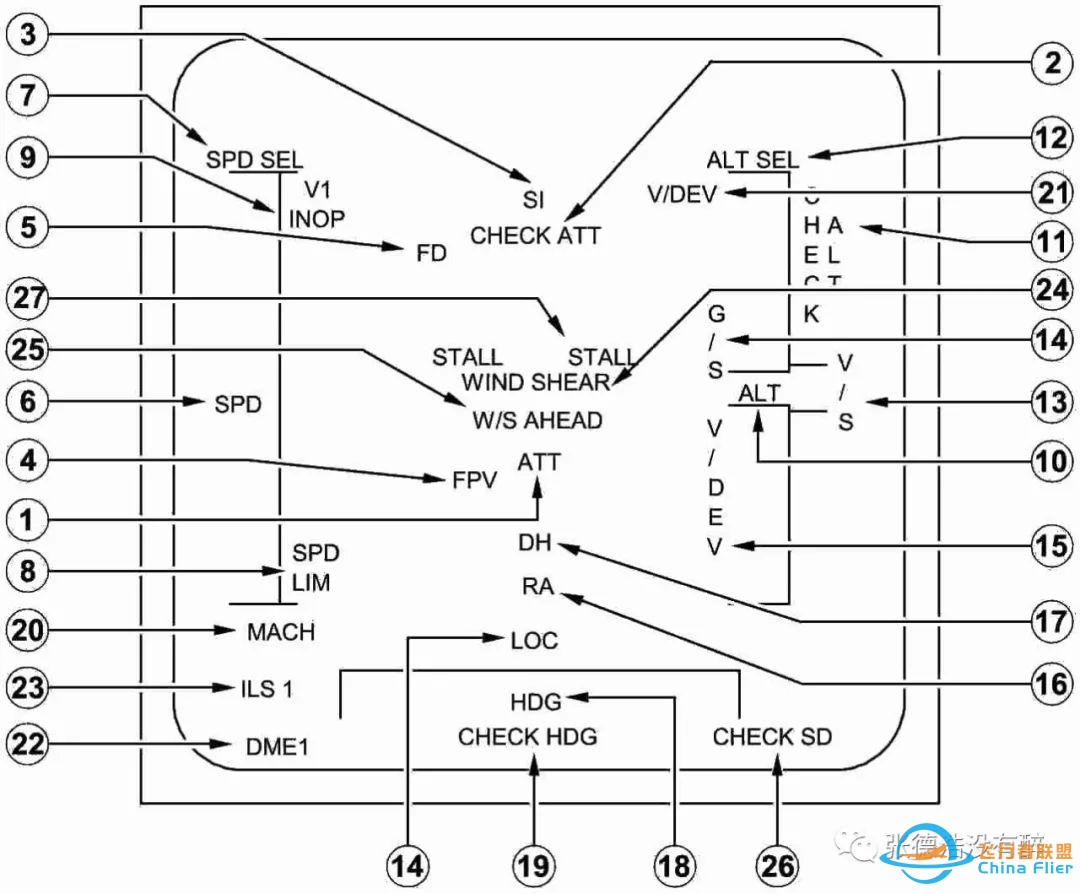
参考 FCOM/DSC-31-40 Flags and Messages Displayed on PFD
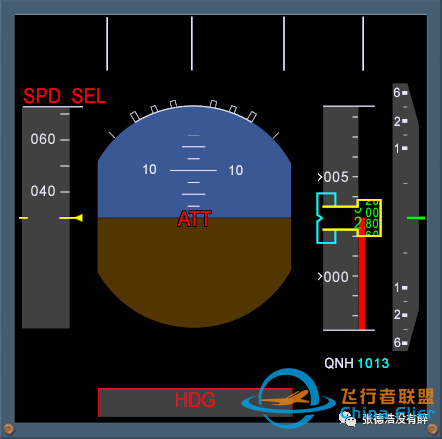
备用速度/高度带 BUSS
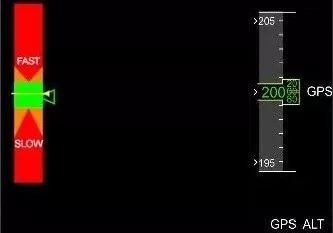
The BUSS is displayed on both PFDs when the flight crew turn off all ADRs. 当飞行机组关闭所有ADR后BUSS显示在两部PFD上。
The activation of this BUSS is not reversible. 启用BUSS是不可逆的
The BUSS information is based on the angle of attack (AOA), and depends on the slat/flap configuration. BUSS信息基于迎角,并且参考襟缝翼构型。
备用速度带 Backup Speed Scale
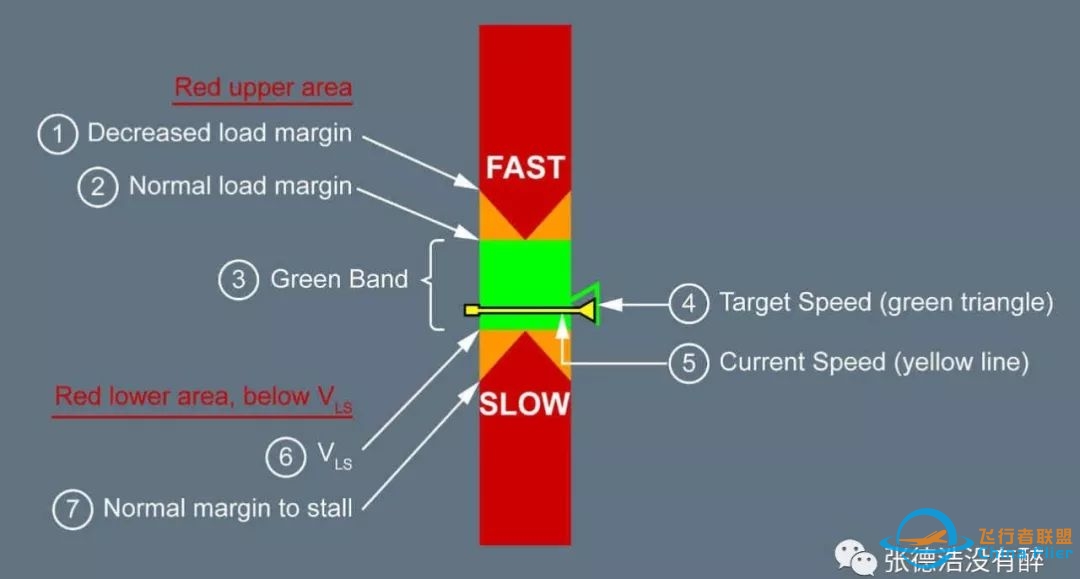
Red FAST area
Amber FAST area
Green area
Target speed (green triangle)
Actual speed reference (yellow line)
Amber SLOW area
Red SLOW area
备用高度带 Backup Altitude Scale
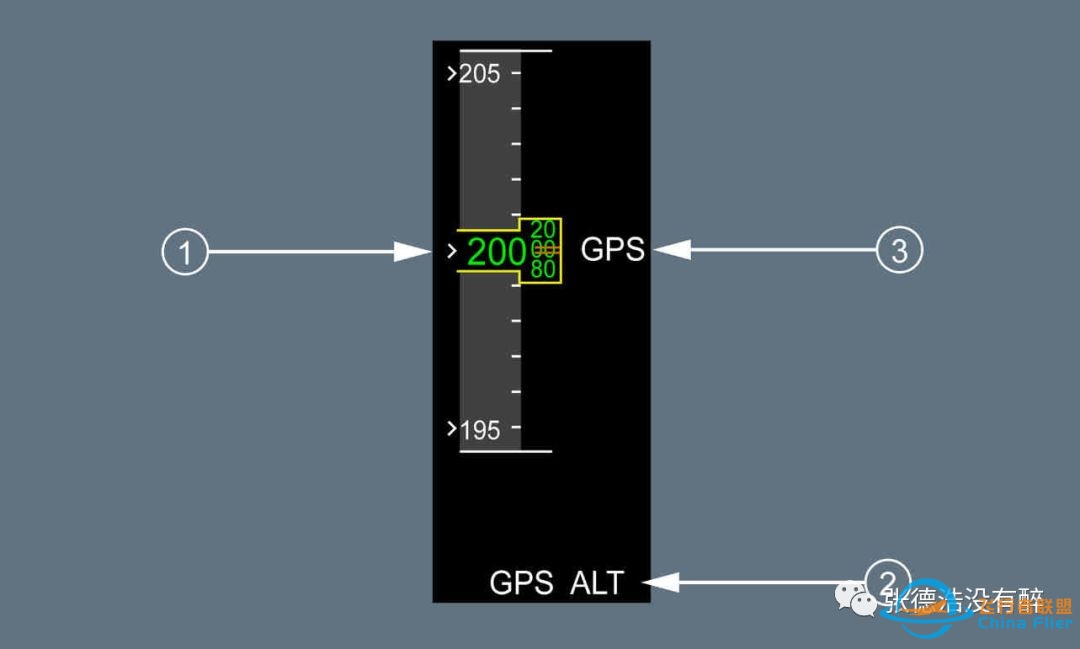
Current GPS altitude 当前GPS高度
GPS ALT flag
GPS flag (displayed depending of the aircraft configuration)
Note: The vertical speed indication is no longer displayed. 垂直速度不再显示
ND 导航显示器
参考 FCOM/DSC-22_10-40-50 Navigation Display
FCOM/DSC-31-45 Indications on ND
The FMGS generates the following information, displayed on the EFIS Navigation Displays:
‐ Flight plan (active secondary, temporary, dashed) 飞行计划
‐ Aircraft position and lateral deviation from the flight plan 飞机位置以及相对飞行计划的水平偏移
‐ Pseudo-waypoints along the flight plan 沿飞行计划的虚拟航路点
‐ Raw data from tuned Navaids and type of selected approach 所调谐的导航台的原始数据以及所选的进近类型
‐ Various display options (waypoints, Navaids, NDBs, airports, constraints)
‐ Wind information and various messages.
通过遮光板上的EFIS控制面板选择ND显示模式和显示范围
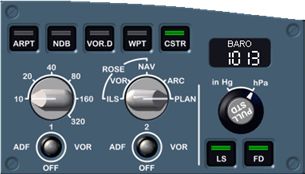
There are five different displays (five modes to display navigation information)五种不同的导航显示模式 :
‐ ROSE LS
‐ ROSE VOR
‐ ROSE NAV
‐ ARC
‐ PLAN
The Navigation Display (ND) can provide a weather radar image in all modes, except PLAN.
PLAN MODE
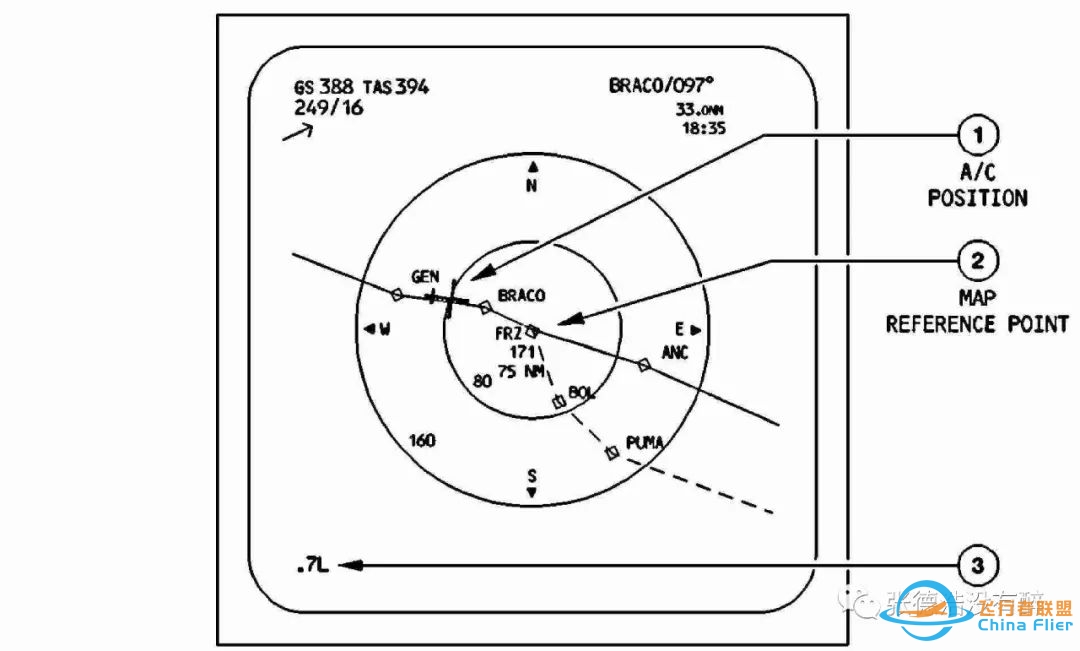
Aircraft Position and True Track 飞机位置和真航迹
Map Reference Point 地图基准点
ARC MODE
ROSE NAV and ARC modes give the pilot the same information, but ARC mode limits it to the forward 90 ° sector. ROSE NAV和ARC给飞行相同信息,ARC模式只显示前方90°扇区。
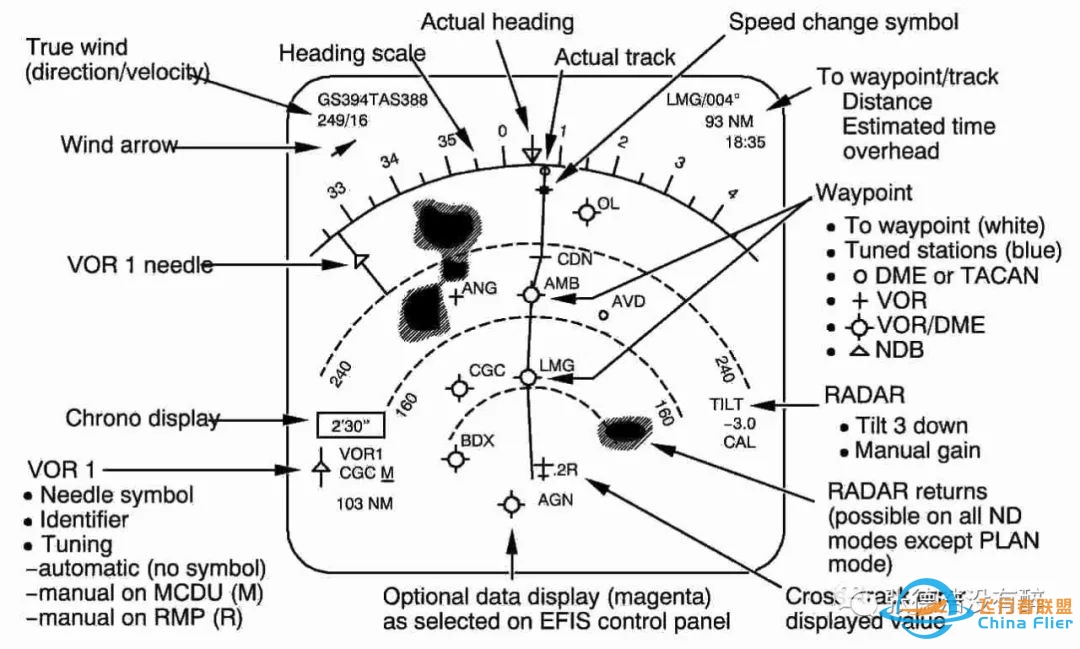
Waypoint: 航路点
Flight plan waypoints 计划航路点
The ND displays these as green diamonds (white, for TO waypoints).
Pseudo waypoint 虚拟航路点
Point of the flight path where the aircraft is predicted to reach a selected altitude or speed. 预计飞机到达所选高度或速度的位置。
TO Waypoint
This is the next waypoint to be overflown, except when a DIR TO with ABEAM PTS has been performed (in this case, the DIR TO waypoint is displayed on the top of the screen instead of the NEXT ABEAM waypoint).
符号定义 参考 FCOM/DSC-31-45 ROSE NAV MODE/ARC MODE
ROSE MODES 通用符号
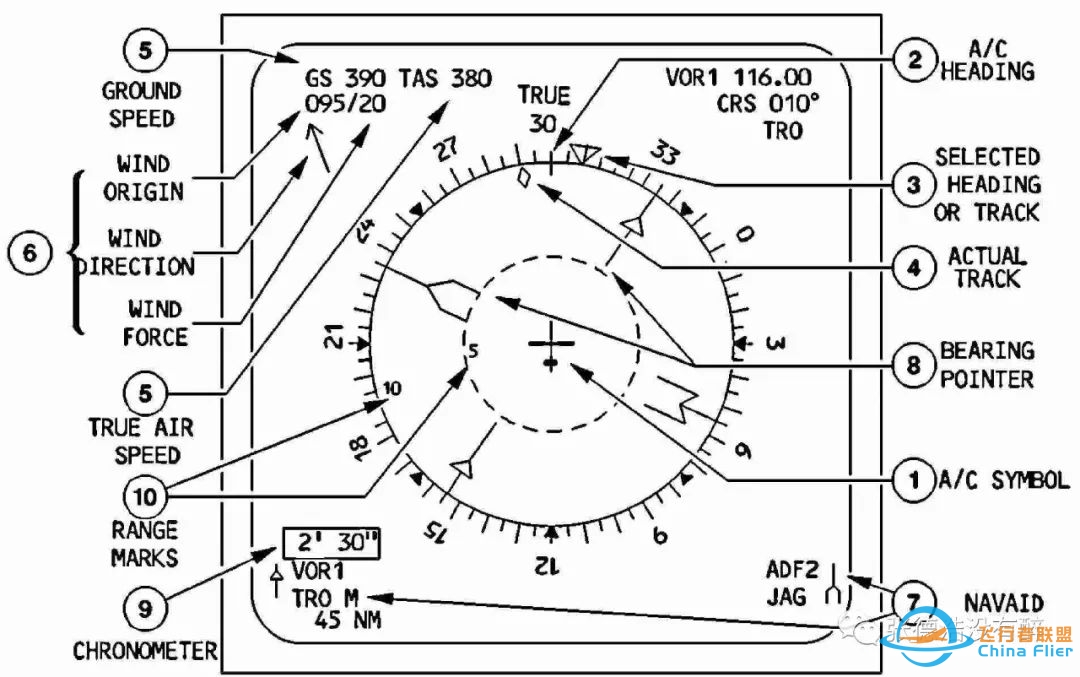
参考 FCOM/DSC-31-45 ROSE MODES
ROSE VOR 模式专属符号
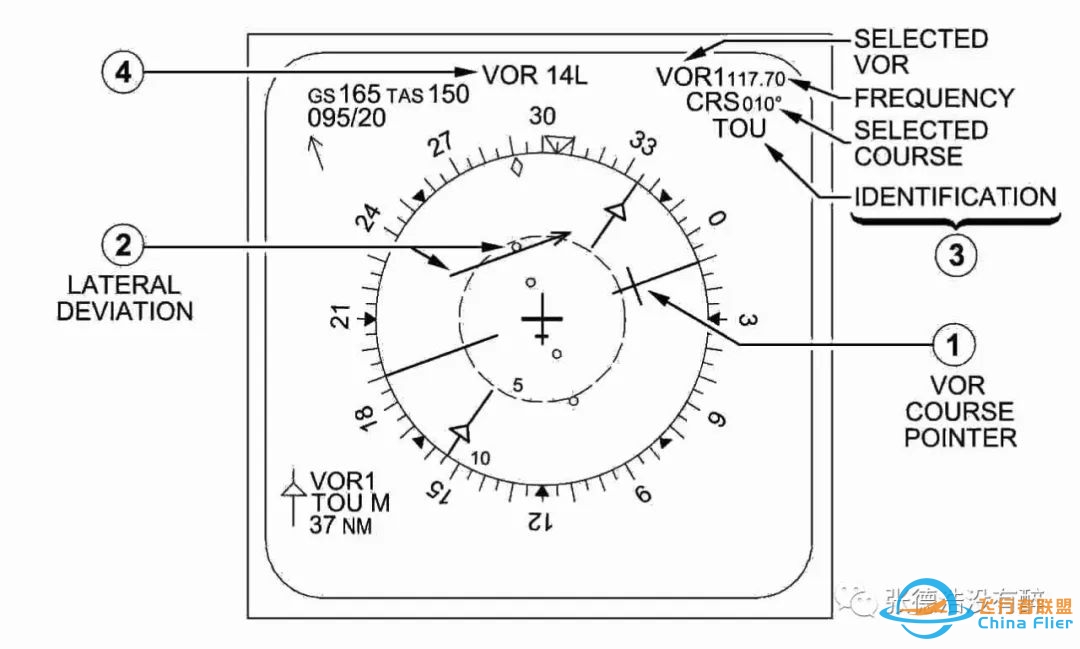
参考 FCOM/DSC-31-45 ROSE VOR MODE
ROSE LS MODE 专属符号
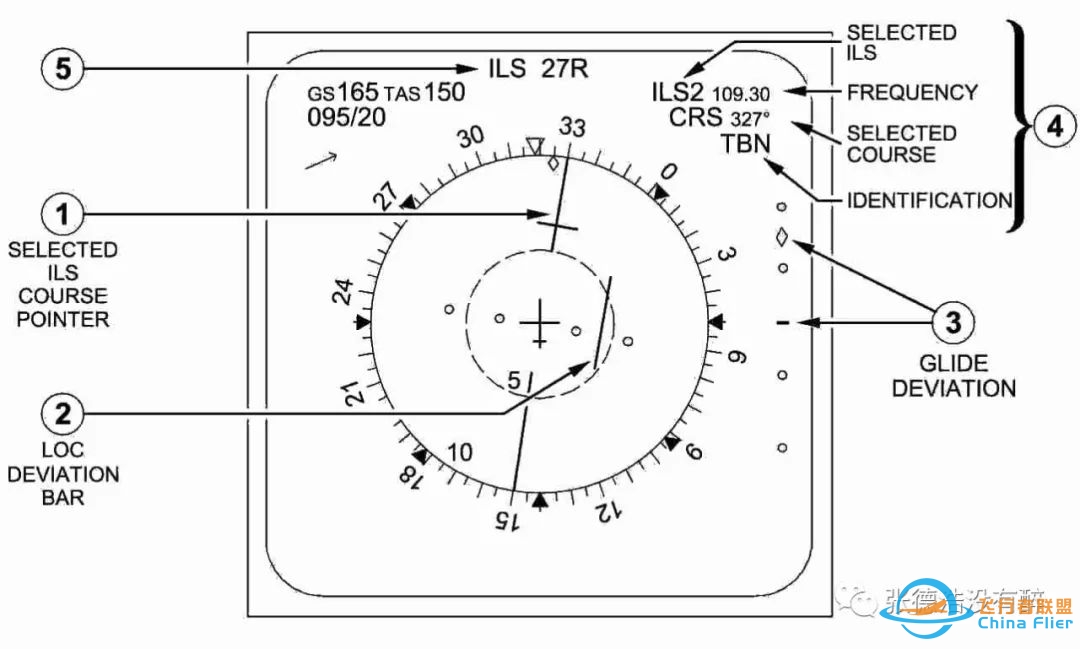
参考 FCOM/DSC-31-45 ROSE LS MODE
ND其它显示
气象雷达 & PWS FCOM/DSC-34-SURV-30-30
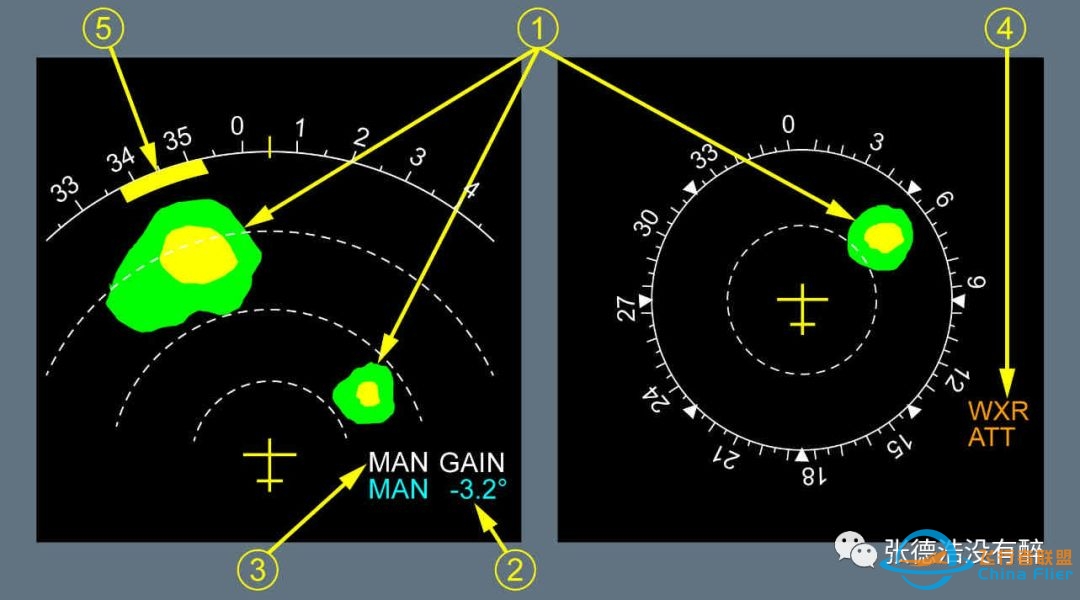
Weather Radar Picture 气象雷达图像
Tilt Angle 倾斜角
Gain Mode 增益模式
Failure Messages 故障信息
Path Attenuation Compensation (PAC) Alert PAC警告
Severe and Moderate Turbulence Display
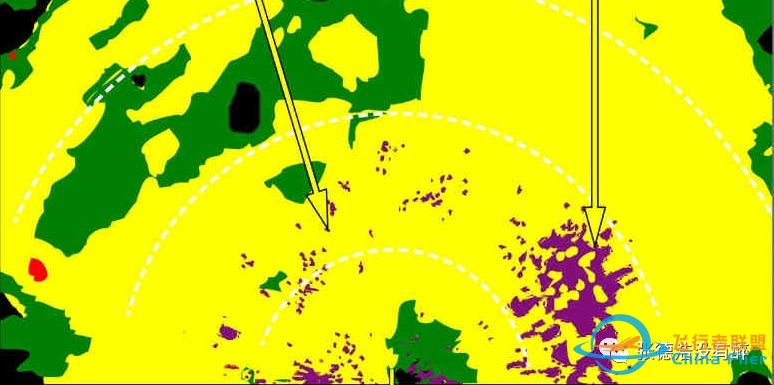
Core Threat Assessment

Associated Threat Assessment
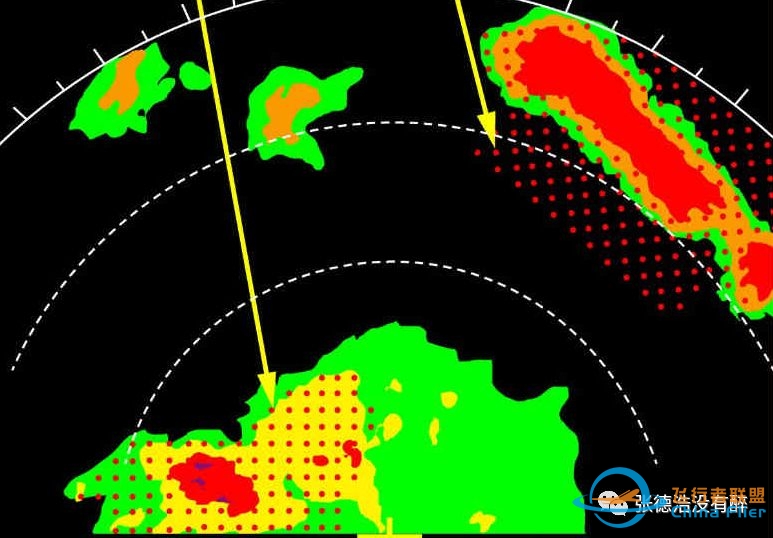
Predictive Overflight Function
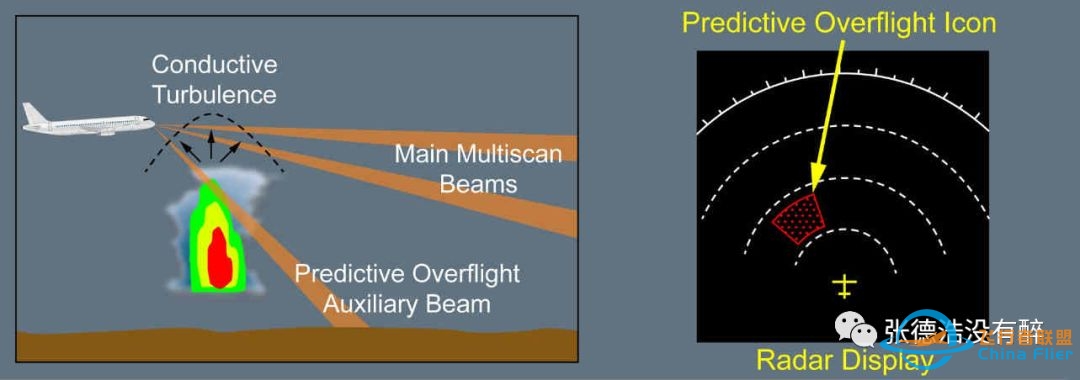
GPWS FCOM/DSC-34-SURV-40-40 GPWS
Terrain on ND
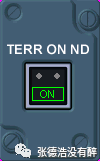
These pushbutton are located on either side of the ECAM. Each pushbutton controls the onside terrain display.
ON : The terrain is displayed on the ND if the: 满足以下条件ND显示地形图像
‐ TERR pb-sw is selected ON, and
‐ TERR FAULT light is not on.
‐ TERR STBY ECAM memo is not displayed.
‐ The FMGS navigation accuracy is high.
The ON light comes on.
OFF : The terrain data is not displayed on the ND.
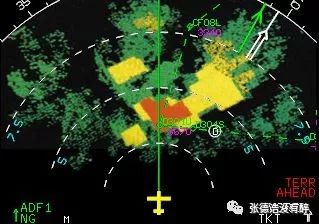
同时参考 FCOM/DSC-31-45 GPWS terrain picture
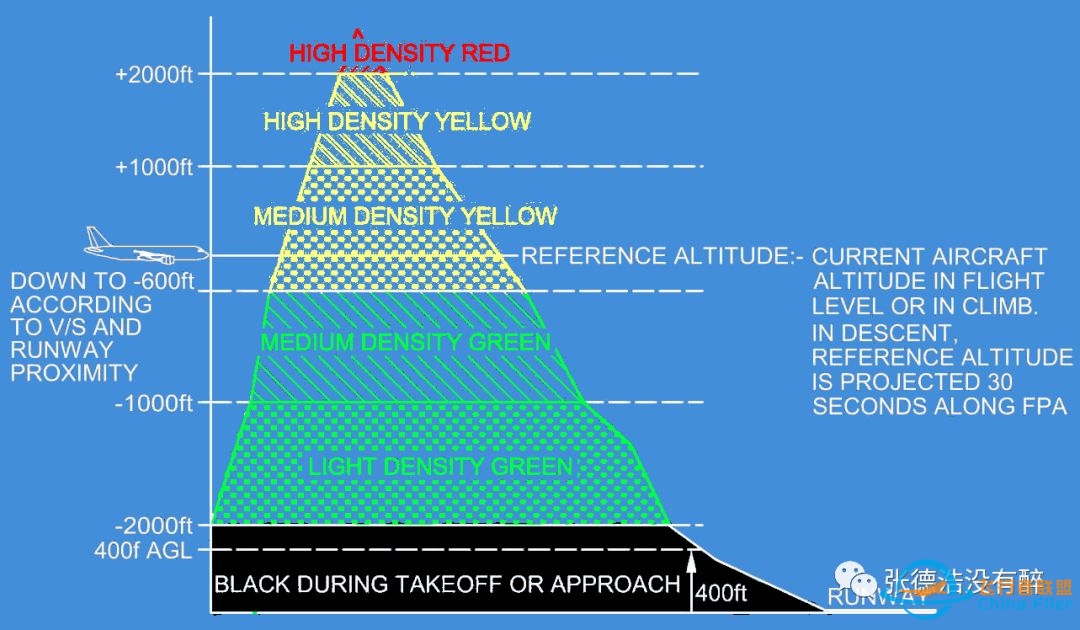
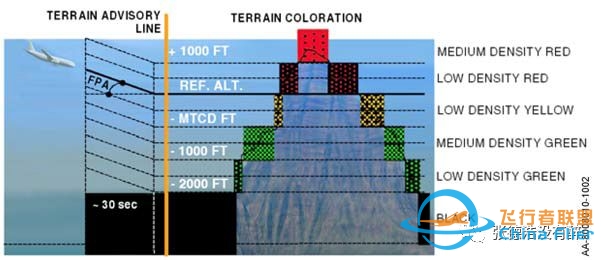
图自 ACSS T3CAS Traffic Management Computer Pilot’s Guide
ATSAW & TCAS
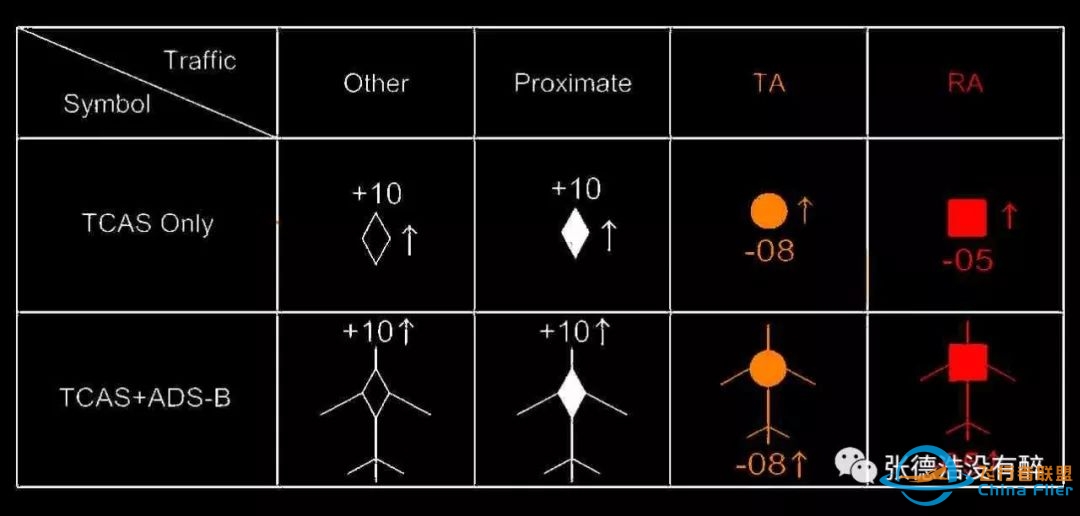
FCOM/DSC-34-SURV-20-30
FCOM/DSC-34-SURV-60-20
ND显示的故障旗和信息
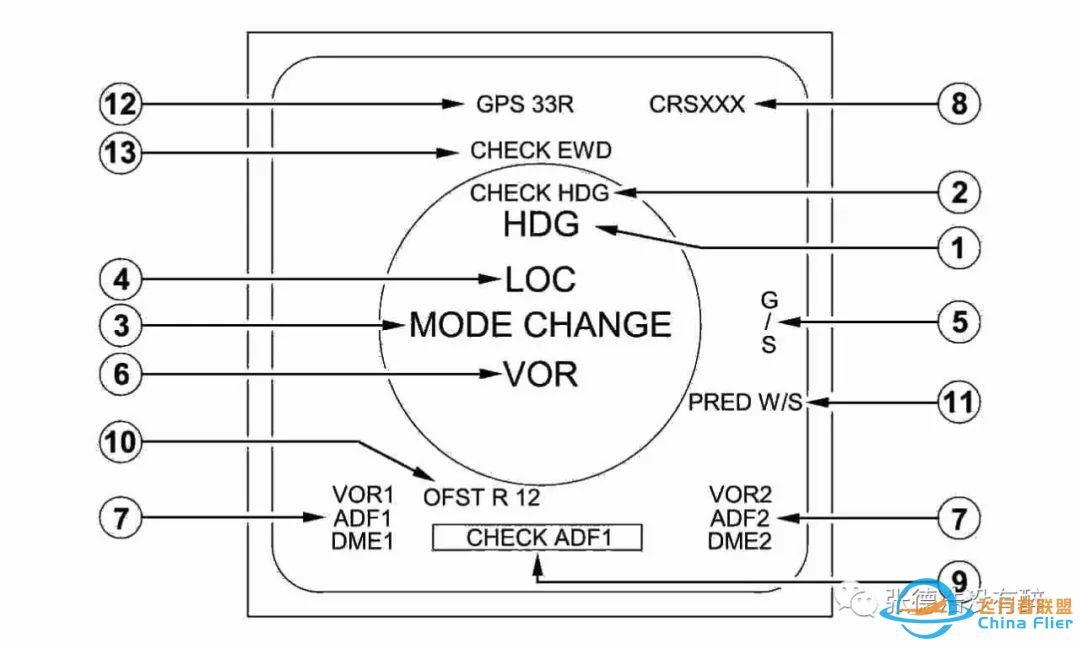
参考 FCOM/DSC-31-45 Flags and Messages Displayed on ND
ECAM 显示组件布局
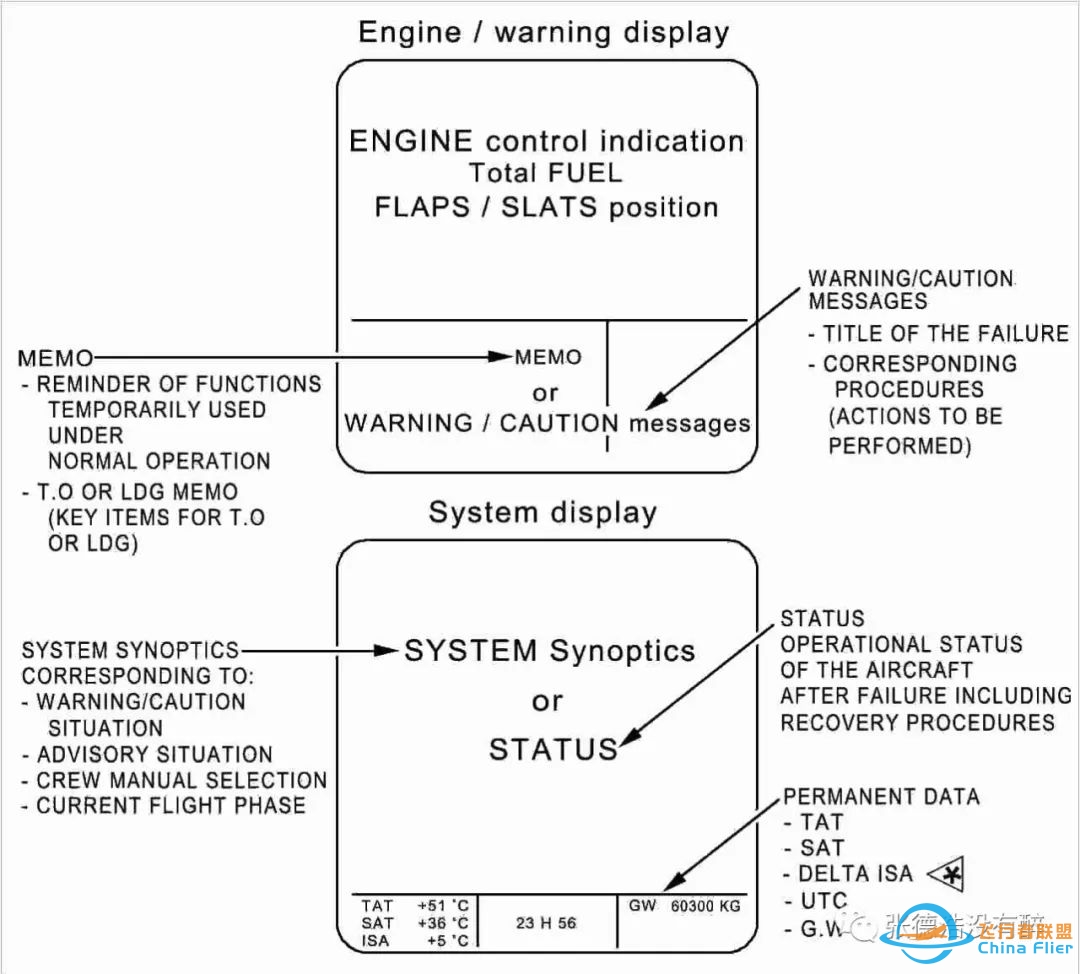
The Engine Warning Display (E/WD) appears on the ECAM's upper Display Unit (DU). 参考 FCOM/DSC-31-15
‐ The upper part of this DU displays:
• Engine parameters 发动机参数(Refer to DSC-70-90-40 Engine Warning Display)
• Feedback messages 反馈信息(Refer to DSC-31-05-60 Feedback Messages)
• Fuel On Board (FOB) 机载燃油(Refer to DSC-28-20 ECAM Upper Display)
• Slats/Flaps' position 缝翼/襟翼位置(Refer to DSC-27-30-20 ECAM Upper Display)
‐ The lower part of this DU displays messages generated by the FWC:
• Warning and caution messages, when a failure occurs 发生故障时的警告和注意信息
• Memos when there is no failure. 没有故障显示备忘信息
E/WD (CFM)
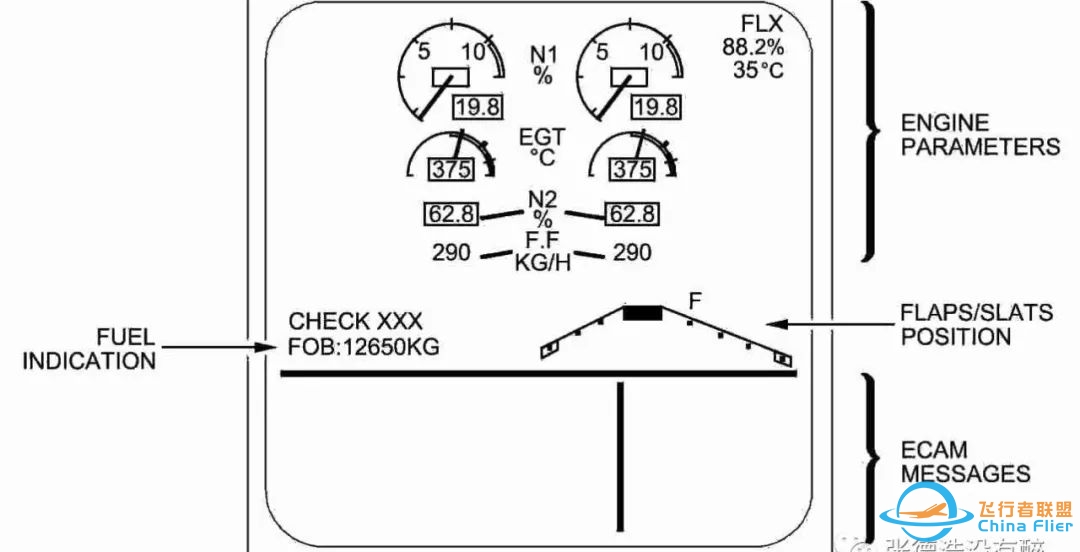
E/WD (IAE)

The lower part of the DU, dedicated to ECAM messages, is divided into two sections of several lines each.
Bottom left : ‐ Primary or independent warnings and cautions, or 主要或独立的警告和注意,或
‐ Memo information. 备忘信息
Bottom right : ‐ Title of the system affected by a primary or independent warning or caution, in case of overflow on the bottom left part, or 左下角满了显示受主要或独立警告或注意的系统标题,或
‐ Secondary failure, or 次级故障,或
‐ Memo, or 备忘
‐ Special lines (such as “AP OFF”, “LAND ASAP”). 特殊行
故障的类型:Type of Failures
Independent : a failure that affects an isolated system or item of equipment without degrading the performance of others in the aircraft. 独立:只影响单独系统或设备而不会导致飞机其他部分性能降级的故障。

If there are too many ECAM messages for the amount of space available in the lower part of the E/WD, a green arrow appears at the bottom of the display, pointing down to show that the information has overflowed off the screen. The pilot can scroll down to view additional messages by pushing the CLR pushbutton on the ECAM control panel (on the pedestal, just below the lower ECAM DU). 消息太多了会有绿色↓指示飞行员用ECP的CLR翻页
Primary : a failure of a system or an item of equipment that costs the aircraft the use of other systems or items of equipment. 主要:系统或设备的故障会牵连飞机的其它部分。
Secondary : the loss of a system or an item of equipment resulting from a primary failure. 次要:受其它主要故障牵连的系统或设备失效。
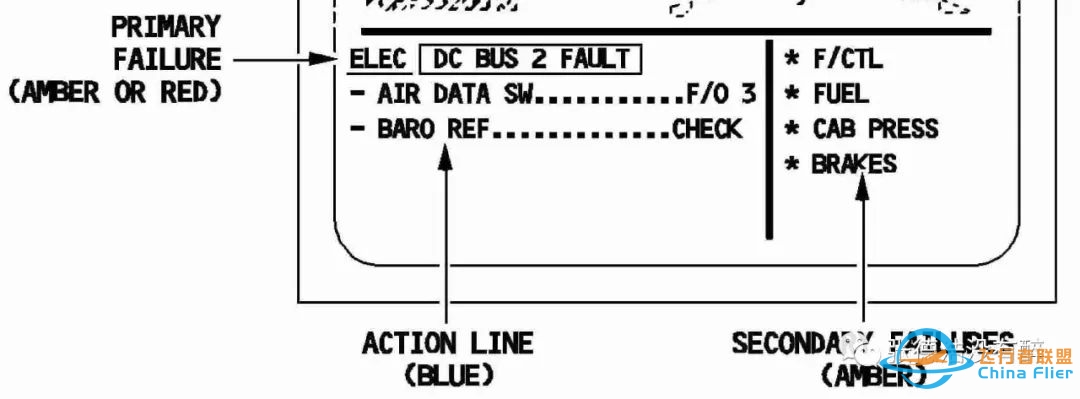
The ECAM DU displays a primary failure as a boxed title. 主要故障标题带框
It identifies a secondary failure by putting a star in front of the title of the affected system. 次级故障标题前面带★
Note: The DU displays the overflow symbol, if primary or secondary failures overflow. In case of ELEC EMER CONFIG, the secondary failures are inhibited. 应急电气形态,次级故障被抑制。
备忘 MEMO
Memos appear in the lower part of the E/WD. They are normally in green, but may be amber in abnormal situations.
Memos list functions or systems that are temporarily used in normal operations. 备忘列出正常操作下临时使用的功能或系统。
TO AND LDG MEMOS 起飞着陆备忘
During the takeoff and landing phases, the right side of the memo area displays specific TO INHIBIT or LDG INHIBIT (magenta) memos.
Takeoff and landing memos are displayed, as follows, during the related flight phases:
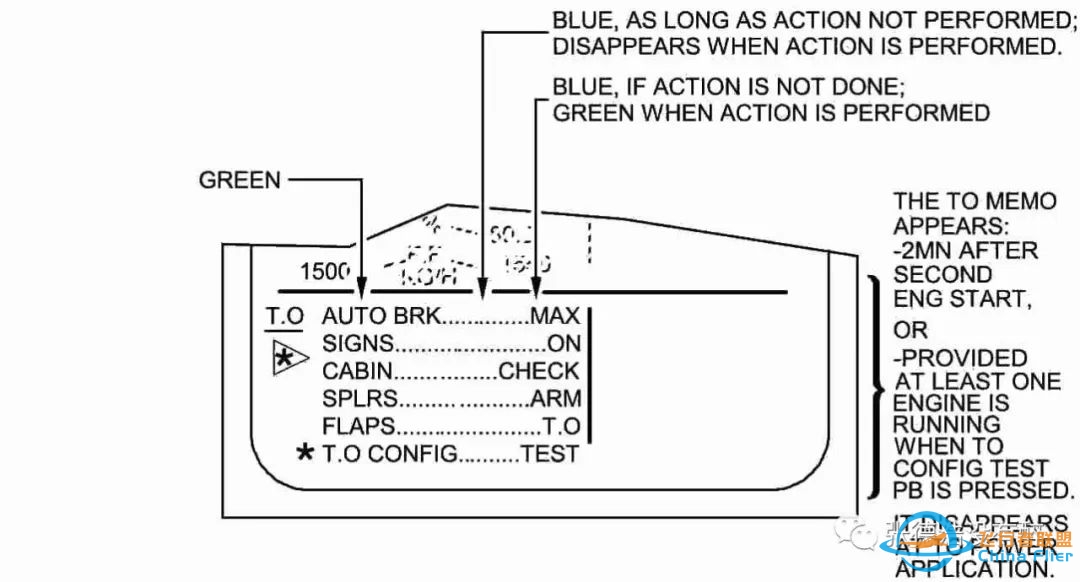
(★) This line disappears when the test is completed. It is replaced by “TO CONFIG NORMAL”, if aircraft configuration is correct.
The test is requested again, if the configuration becomes abnormal.

(★) “CONF 3” is displayed in alternate or direct law, or if the GPWS LDG FLAP 3 pushbutton is ON.
Note: After a go-around, if the aircraft does not climb above 2 200 ft RA, the landing memo appears only below 800 ft RA during the subsequent approach.复飞后飞机没有爬到2200ft RA以上,接下来进近到低于800ft RA才出现着陆MEMO。
SD 系统显示器 参考 FCOM/DSC-31-20
The system/status display (SD) uses the lower ECAM DU to display :
‐ pages showing synoptic diagrams of the aircraft systems, or 飞机系统的示意图,或
‐ the status page. 状态页
系统页面 Syetem Page
The lower ECAM DU can display 12 system pages (For description see relevant FCOM chapter): 一共有12个系统页面
‐ ENGINE (secondary engine parameters) 次要发动机参数
‐ BLEED (air bleed) 引气
‐ CAB PRESS (cabin pressurization) 客舱增压
‐ ELEC (electric power) 电源
‐ HYD (hydraulic) 液压
‐ FUEL (fuel) 燃油
‐ APU (auxiliary power unit) 辅助动力单元
‐ COND (air conditioning) 空调
‐ DOOR/OXY (doors/oxygen) 舱门/氧气
‐ WHEEL (landing gear, braking, ground spoilers, etc.) 起落架,刹车,扰流板等
‐ F/CTL (flight controls) 飞行操纵
‐ CRUISE (cruise) 巡航
The relevant system page automatically appears, as soon as any fault or malfunction triggers a caution or warning message. 当任何故障或异常触发注意和警告消息相关系统页面自动出现。
• The relevant system page automatically appears, when a parameter drifts out of its normal range. 当参数偏出正常范围相关系统页面自动出现。
• The value (shown in green) pulses, as long as it is outside its limits. 数值超限,以绿色闪烁。
• The advisory mode is inhibited in some flight phases. 某些飞行阶段抑制咨询模式。
• If no other mode is engaged, the SD displays the system page related to the present flight phase, as shown in the following diagram. 飞行阶段示意图
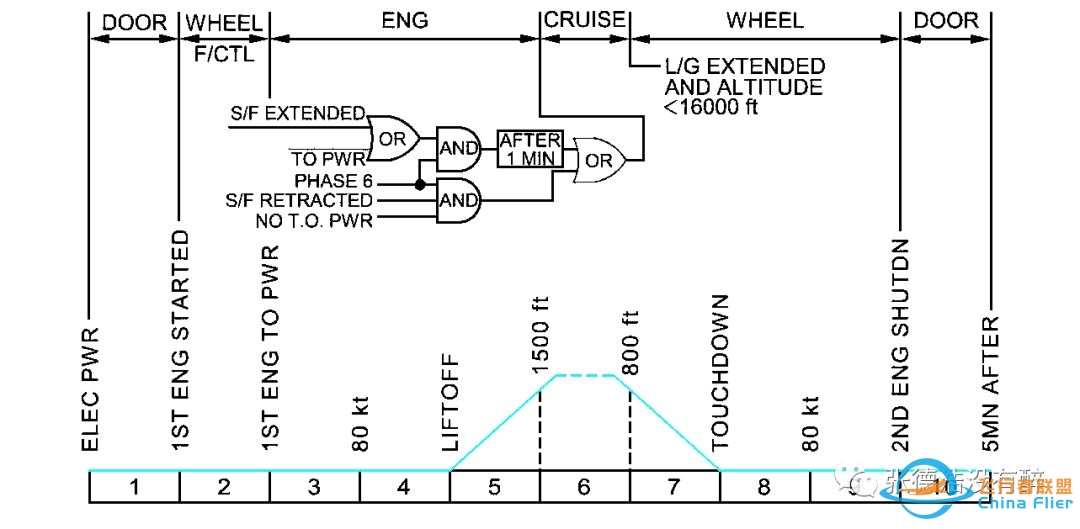
• Phase 2 : The F/CTL page replaces the WHEEL page for 20 s when either pilot moves his sidestick (more than 3 ° in pitch or roll) or when the rudder pedal deflection is more than 22 °. 阶段2侧杆移动超过3°或脚蹬偏转超过22° F/CTL页面取代WHEEL页面显示20秒。
• The APU page appears when the APU MASTER switch is ON. It disappears when APU RPM has been above 95 % for 10 s, or when the APU MASTER switch is switched OFF.
• The ENGINE page appears at the beginning of start sequence or when a pilot selects “CRANK”. It disappears 10 s after the end of the start sequence, when the ENG MODE sel is set to NORM.
状态页
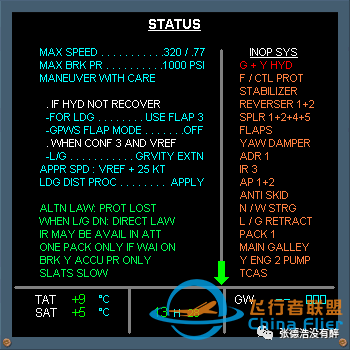
固定数据

Temperature 温度
G LOAD 载荷
UTC
GW 总重
EIS 系统构成参考 FCOM/DSC-31-05-30
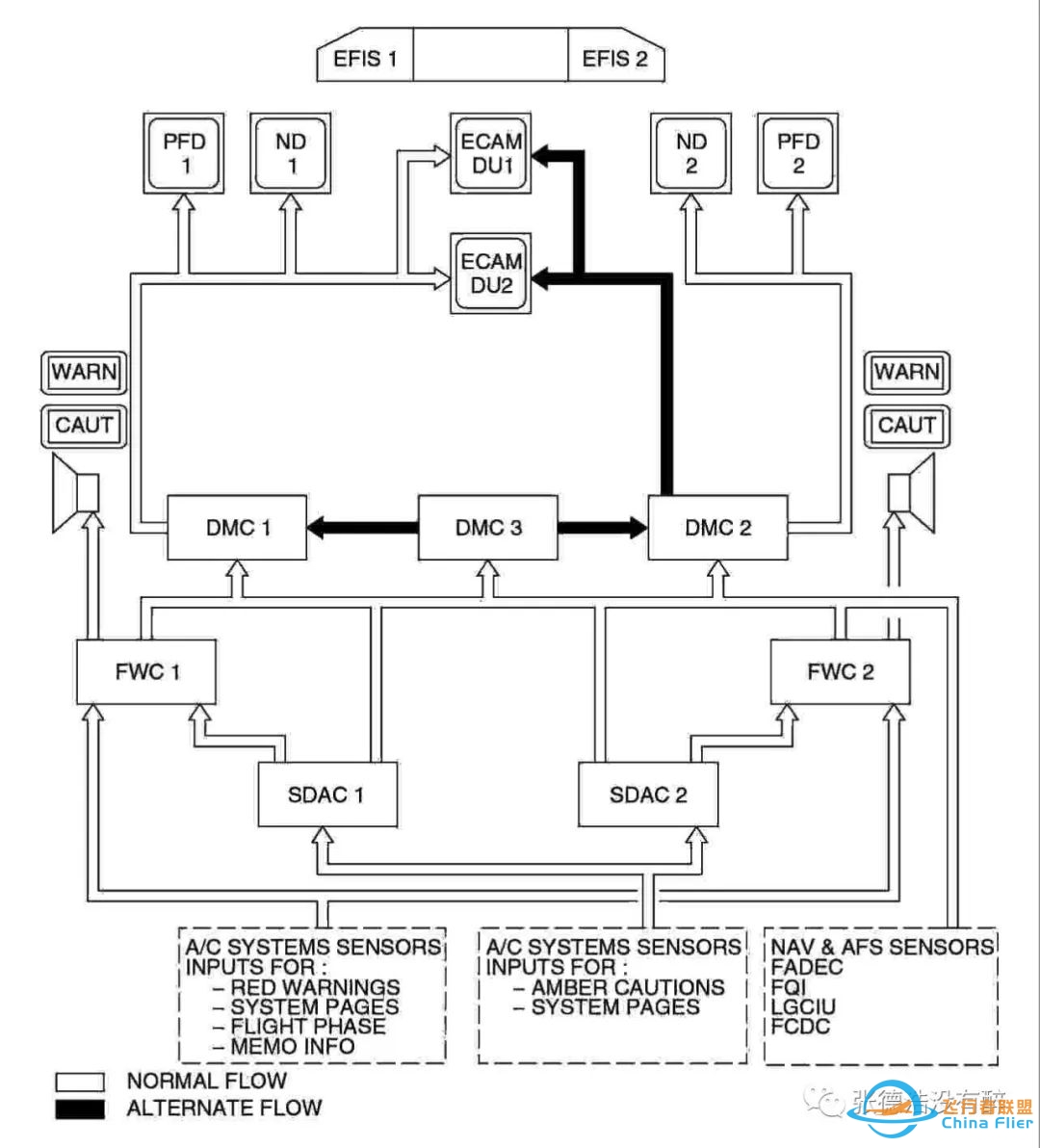
ADIRS 参考FCOM/DSC-34-NAV-10-10
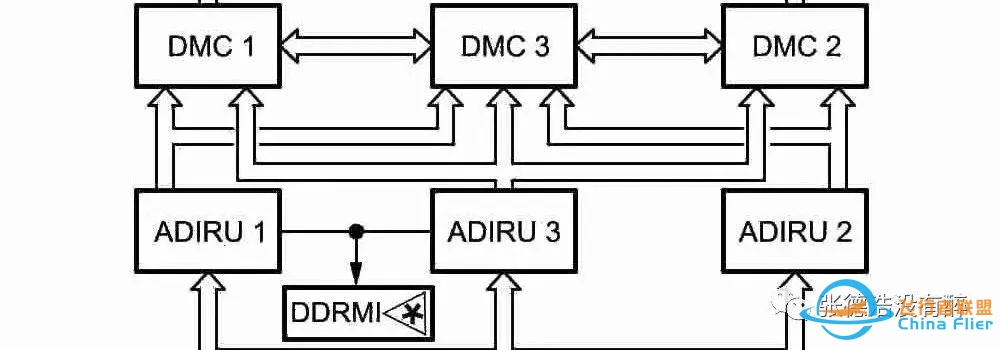
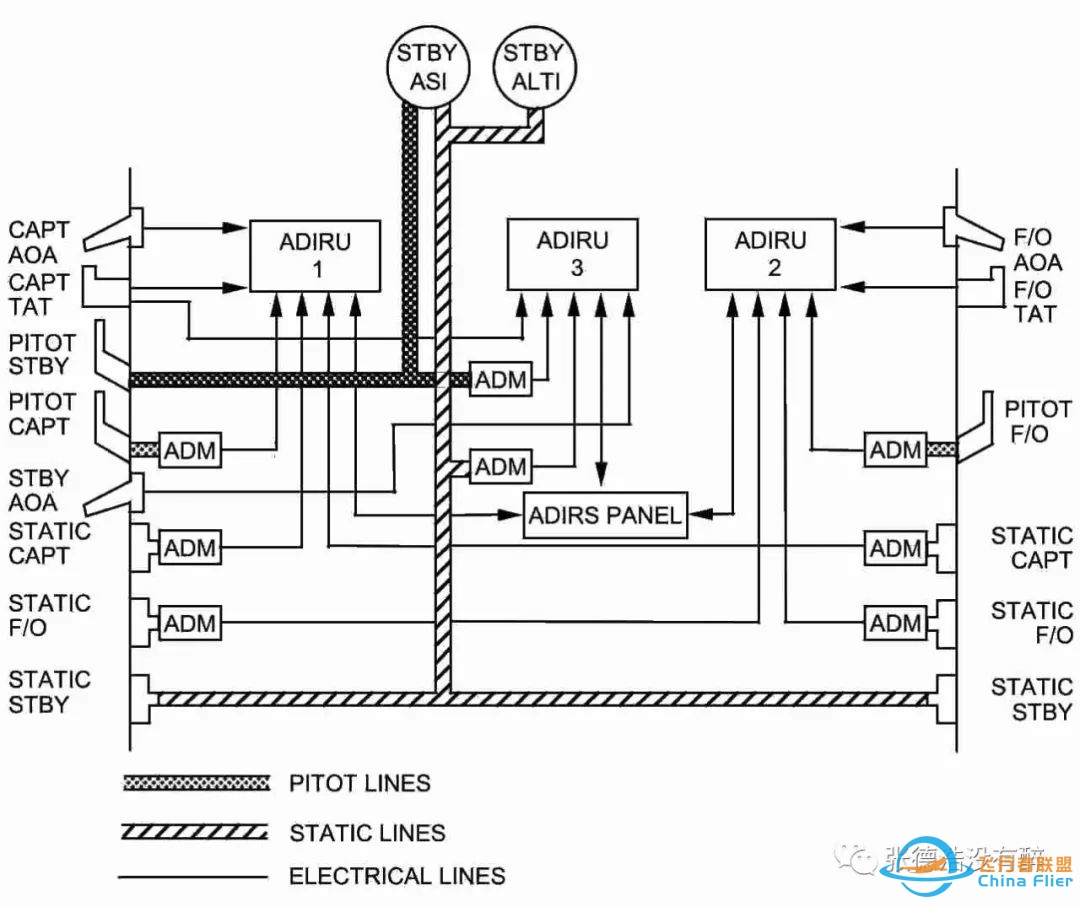
DMC再构型 参考FCOM/DSC-31-05-50
In normal operation, each DMC drives the following Display Units :
‐ DMC 1 drives the CAPT PFD, CAPT ND and the ECAM DUs.
‐ DMC 2 drives the F/O PFD and F/O ND.
‐ DMC 3 is on standby, ready to drive any DU.
If DMC 1 or 2 fails (the “INVALID DATA” message is displayed on the DUs), the crew manually selects the DMC 3 source (“CAPT 3” or “F/O 3”).
If DMC 1 fails (or DMC 3, if “CAPT 3” was selected), DMC 2 automatically drives the ECAM.
DU再构型 参考 FCOM/DSC-31-05-60
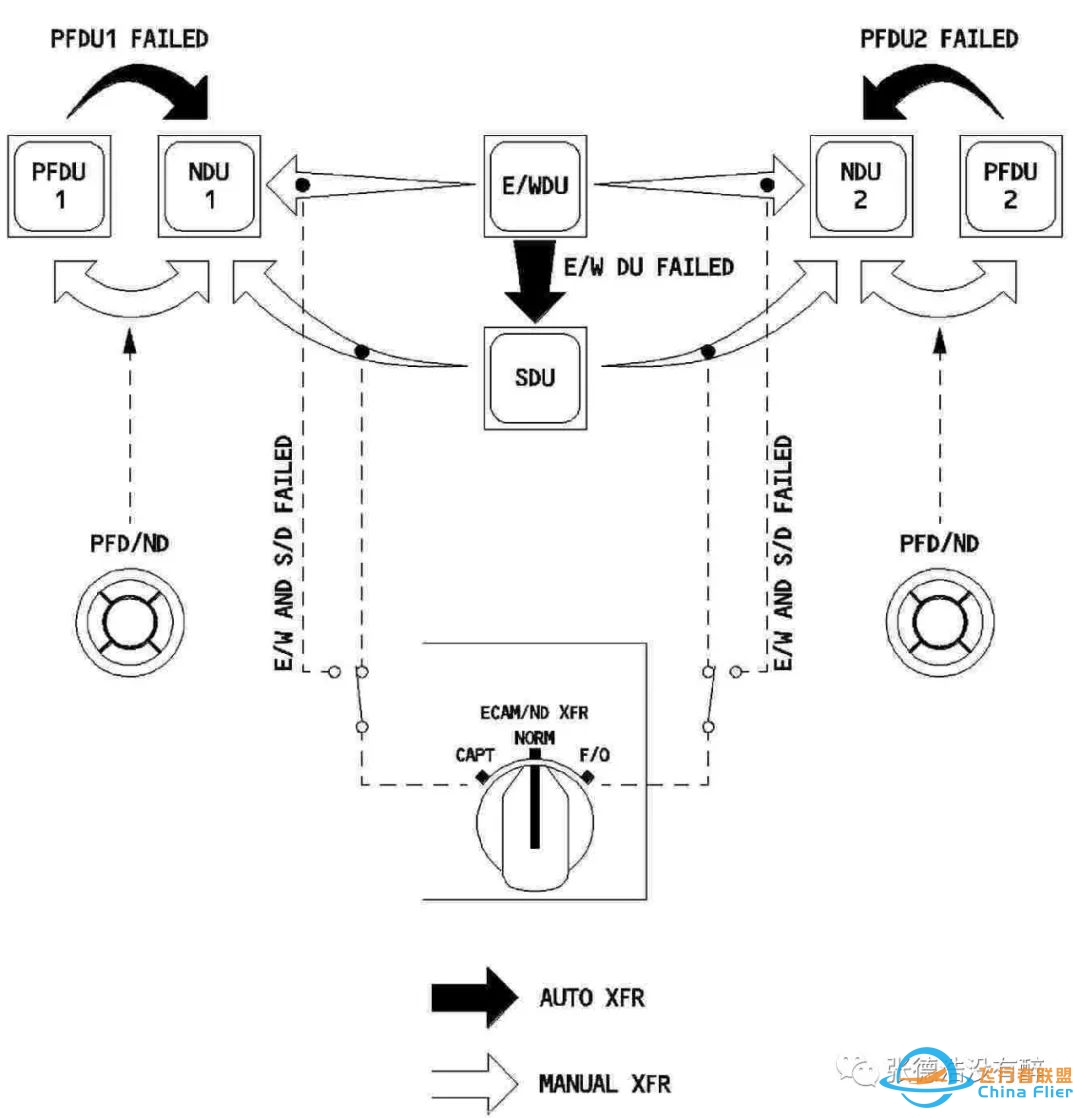
应急电气形态 参考 [QRH] ELEC EMER CONFIG SYS REMAINING
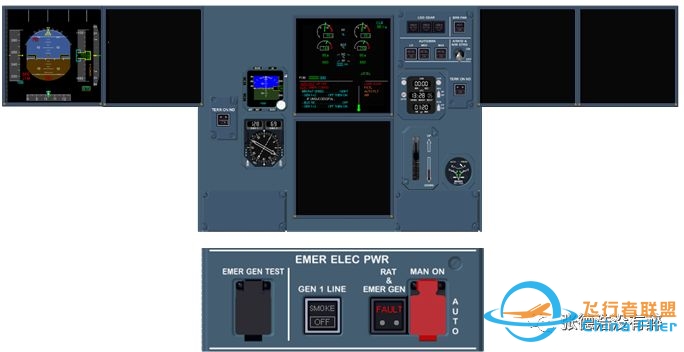
颜色编码 参考 FCOM/DSC-31-10 Color Code
The ECAM display uses a color code that indicates the importance of the failure or the indication.
RED : The configuration or failure requires immediate action. 需要立即采取措施
AMBER : The flight crew should be aware of the configuration or failure, but need not take immediate action. 应当知晓情况,不必马上行动
GREEN : The item is operating normally. 正常
WHITE : These titles and remarks guide the flight crew, as they execute various procedures. 标题和执行程序的说明。
BLUE : These are actions to be carried out, or limitations. 限制或将要采取的措施。
MAGENTA : These are particular messages that apply to particular pieces of equipment or situations (inhibition messages, for example). 特定情况下的信息,例如抑制信息。
告警 FCTM/AOP-10-20-20 Alerts
ALERT TRIGGERING 告警触发
As a general rule, an alert is required when:一般情况下,当出现下列情况时触发告警
‐ A system failure occurs 出现系统失效
‐ The aircraft violates the normal flight envelope 飞机违反正常飞行包线
‐ An unexpected event related to safety occurs 出现安全有关的以外事件(e.g. TCAS, TAWS)
‐ An outside message is coming up 出现来自外界的信息(e.g. cabin 客舱, ATC)
‐ A system automatically changes its mode of operation 系统自动改变操作方式(e.g. AP auto-disconnection AP自动断开, mode reversion 模式转换).
The alerts:该告警
‐ Trigger visual and/or aural indications 触发目视和/或音响指示
‐ Are ranked by severity and priority 根据严重性和优先性排序
‐ Are inhibited when not relevant in some specific flight phases.与某些特定的飞行阶段无关时被抑制。
ALEART INDICATION 告警指示
The alerts indications are presented to the flight crew as follows 告警指示以下列方式呈现给飞行机组:
‐ Initial indication (visual or aural) via the MASTER CAUTION or MASTER WARNING
视觉或听觉初始指示
‐ The Engine Warning Display (EWD) displays the title of the alert related to the failure
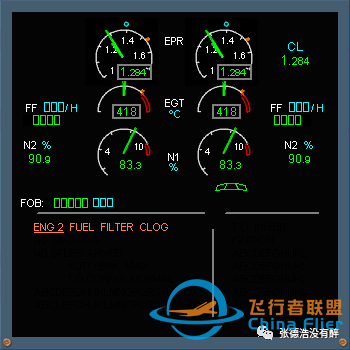
发动机警告显示器(EWD)显示与失效有关的告警标题
‐ The System Display (SD) automatically displays the affected system
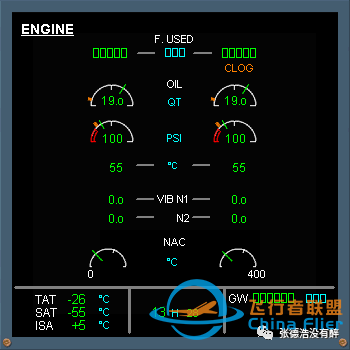
系统显示器(SD)自动显示受影响的系统
‐ On the overhead panel, the pushbutton/pushbutton-switch light of the affected system comes on in amber or red. 在顶板上,受影响系统的按钮灯亮琥珀色或红色
警告/注意分级 参考 FCOM/DSC-31-10 Warning/Caution Classification
优先原则:There are three priority levels for warnings and cautions :
- A level 3 warning has priority over a level 2 caution which has priority over a level 1 caution. 3级警告优先于2级注意优先于1级注意。
The FWC observes these priorities. FWC监控这些优先级。
The following outlines the ECAM’s operating modes:
Normal Mode: 正常模式
Failure Mode: 故障模式
Advisory Mode: 咨询模式
Manual Mode: 人工模式
Most warnings and cautions are inhibited during critical phases of flight (T/O INHIBIT – LDG INHIBIT), because most system failures will not affect the aircraft’s ability to continue a takeoff or landing. 大多数警告和注意在飞行关键阶段被抑制,因为大多数系统故障不影响飞机继续起飞或着陆的能力。
飞行警告计算机 FCOM/DSC-31-05-30 Flight Warning Computer (FWC)
The two identical FWCs generate alert messages 警告消息, memos 备忘, aural alerts 音响警告, and synthetic voice messages 合成语音消息. For this purpose they acquire data:
‐ Directly from aircraft sensors, or systems, to generate red warnings
‐ Through the SDACs to generate amber cautions.
The ECAM display units display the alert messages generated by the FWCs.
The FWCs also generate:
‐ Radio height callouts 无线电高度喊话(参考 FCOM/DSC-34-NAV-40-10 Automatic Callout)
‐ Decision height callouts 决断高喊话
‐ Landing distance and landing speed increments. 着陆距离和着陆速度增量。
The communications loudspeakers announce aural alerts and voice messages, and do so even when they are turned off. 扬声器播放音响警告和语言消息,即使被关闭依然如此。
低能量警告 参考FCOM/DSC-22_40-30 Low - Energy Aural Alert
音响指示 参考 FCOM/DSC-31-10 Audio Indicators
高度警告 参考 FCOM/DSC-31-40 Altitude Alert
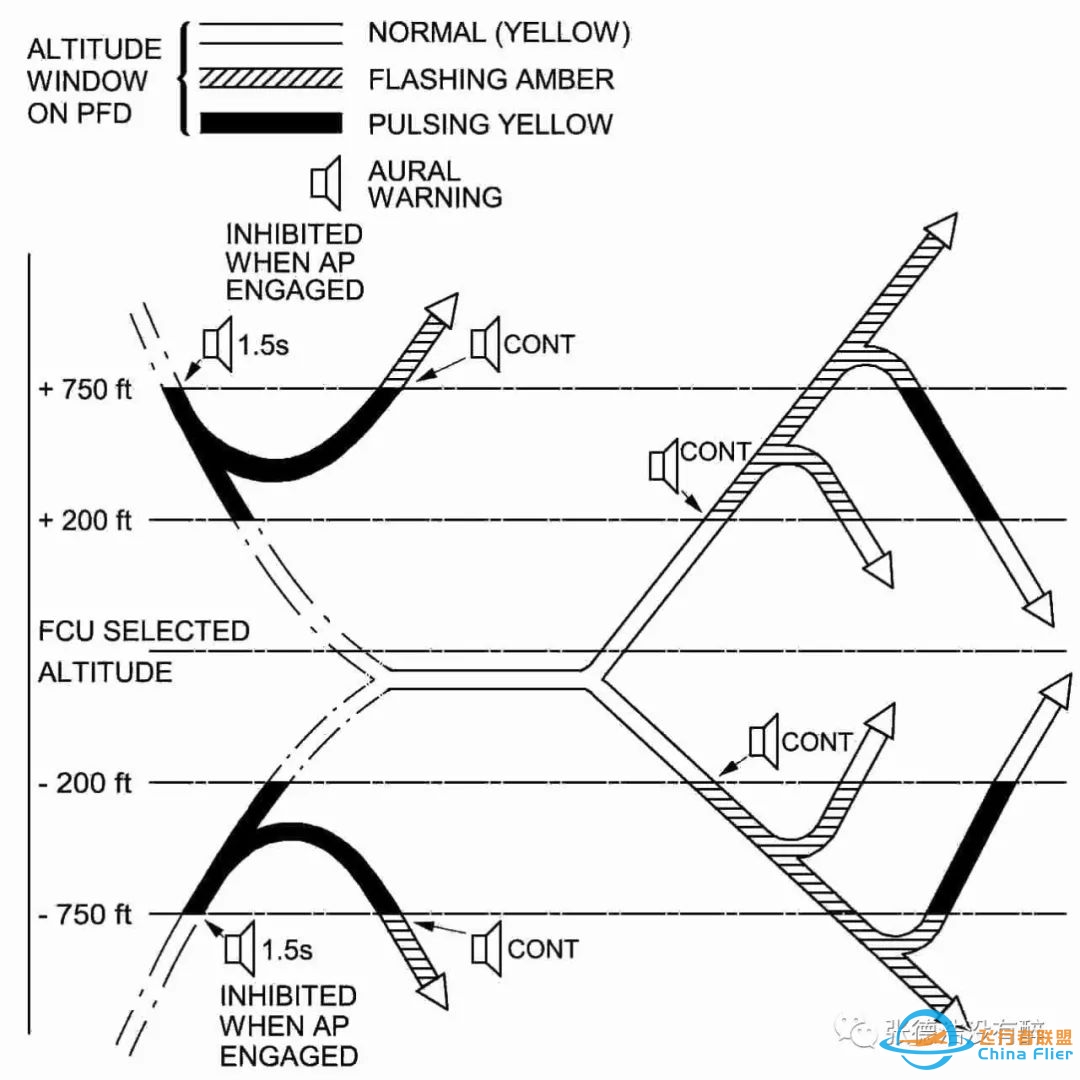
EGPWS (Refer to DSC-34-SURV-40-10 Overview)
TCAS (Refer to DSC-34-SURV-60-20 Aural Messages)
侧仪表面板
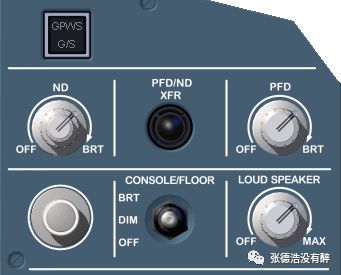
FCOM/DSC-34-SURV-40-40 PULL UP – GPWS pushbutton
FCOM/DSC-31-50 OFF/BRT knobs & PFD/ND Pushbutton
FCOM/DSC-23-10-50 Loudspeaker Volume Knob
FCOM/DSC-33-10-30 CONSOLE/FLOOR sw
FCOM/DSC-34-SURV-20-30 Traffic Selector (目前公司A321全部选装)
起落架指示 FCOM/DSC-32-10-40 Landing Gear Indicator Panel
This panel is connected to LGCIU1, which receives signals from proximity detectors.
▿ light: comes on green if the gear is locked down.
UNLK light: comes on red if the gear is not locked in the selected position.
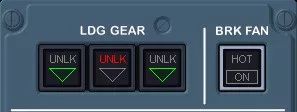
刹车风扇 FCOM/DSC-32-30-20 Brake Fan
ON light : The brake fans run if the lefthand main landing gear is down and locked
Off : The brake fans stop
HOT light : This amber light comes on when the brakes get too hot (A caution appears on ECAM, also)
自动刹车 FCOM/DSC-32-30-20 Auto Brake Panel
The springloaded MAX, MED, and LO pushbutton switches arm the appropriate deceleration rate. 预位大致的减速率
ON light : comes on blue to indicate positive arming 预位显示ON
DECEL light : comes on green when the actual deceleration is 80 % of the selected rate 实际减速率达到所选档位的80%
Off : The corresponding autobrake mode is not armed
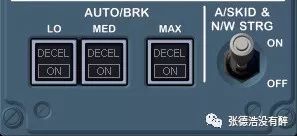
防滞&前轮转弯 FCOM/DSC-32-30-20 A/SKID & N/W STRG sw
ON : If green hydraulic pressure is available, then antiskid is available. 绿液压可以,防滞可用
OFF : The yellow hydraulic system supplies pressure to the brakes. 黄液压系统供应刹车压力
时钟 DSC-31-55 Clock
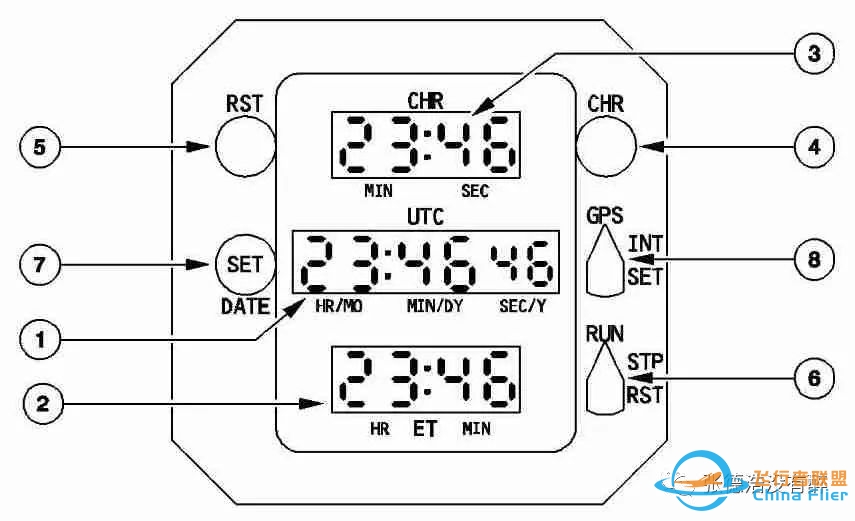
UTC (GMT) counter
Elapsed Time (ET) 经过时间
Chrono (CHR) counter 计时器
CHR pushbutton 计时器按钮
Reset (RST) pushbutton 重置按钮
ET selector 经过时间选择器
DATE/SET pushbutton 日期/设置按钮
UTC selector UTC选择器
起落架选择手柄
FCOM/DSC-32-10-40 Landing Gear Selector Lever
L/G LEVER
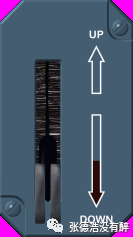
UP : This position selects landing gear retraction.
DOWN : This position selects landing gear extension.
RED ARROW 红色箭头↓
This red arrow lights up if the landing gear is not locked down when the aircraft is in the landing configuration, and a red warning appears on ECAM. 着陆形态起落架没有放下锁定,ECAM显示红色警告
刹车和储压器压力指示
FCOM/DSC-32-30-20 BRAKES and ACCU PRESS indicator
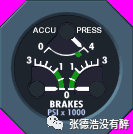
Brake pressure is only indicated when the yellow hydraulic system controls the brake pressure, This is when the: 刹车压力只显示黄液压系统控制的刹车压力,当
‐ Alternate braking system is activated, or 启用备用刹车,或
‐ Parking brake is applied. 设置了停留刹车
ACCU PRESS : Indicates the pressure in the yellow brake accumulator. 显示黄刹车储压器压力
BRAKES : Indicates the yellow pressure delivered to the left and right brakes, as measured upstream of the alternate servovalves. 分别显示左右刹车上游备用伺服活门压力。
ISIS FCOM/DSC-34-NAV-20 Integrated Standby Instrument System
基础功能(类似PFD)
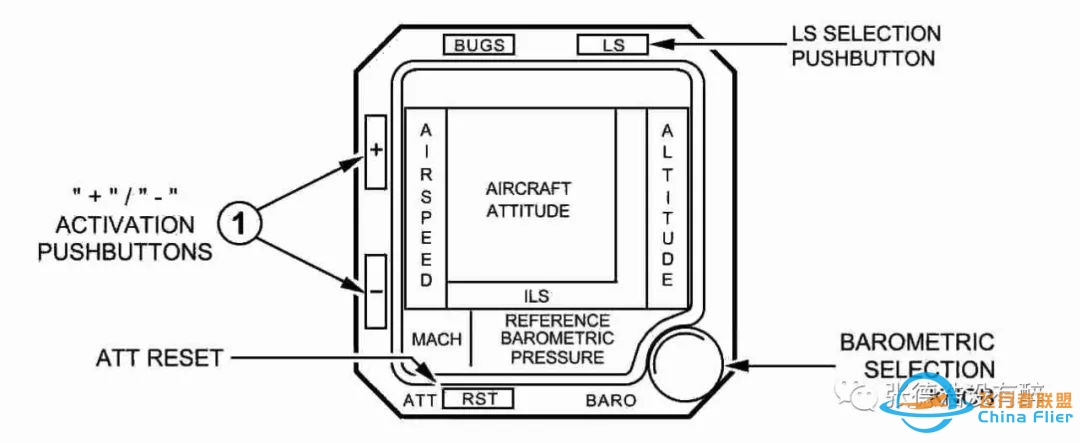
游标功能
FCOM/DSC-34-NAV-20 Bugs Function
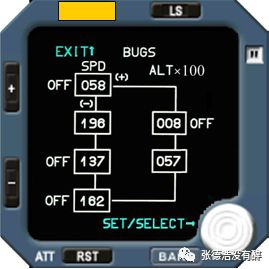
BUGS function selection pushbutton
Pressing the BUGS pushbutton will activate the BUGS function and display the bug values to be selected.
故障旗 FCOM/DSC-34-NAV-20 Flags
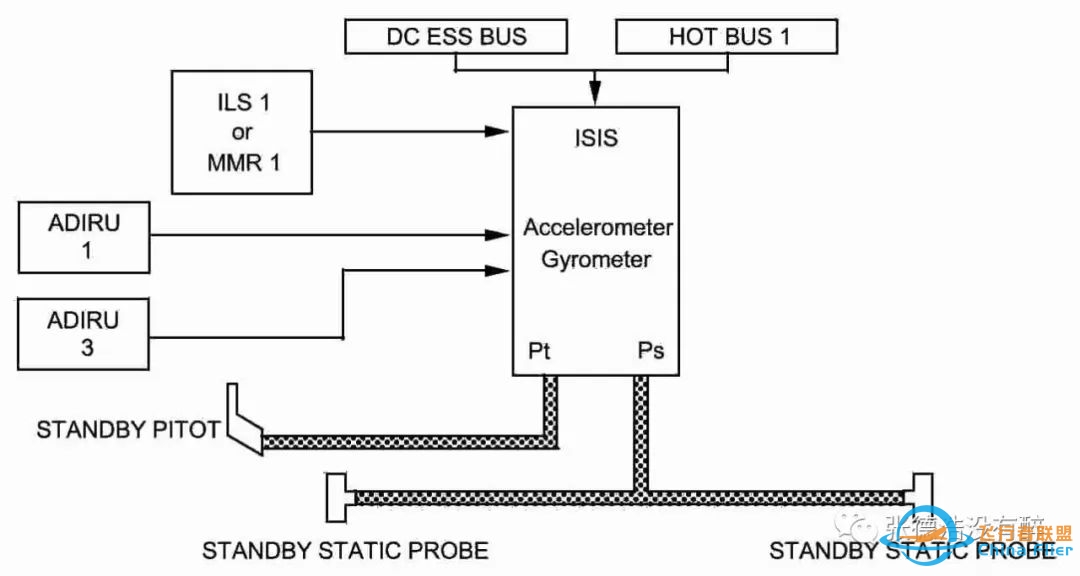
DDRMI FCOM/DSC-34-NAV-30-30 Digital Distance and Radio Magnetic Indicator
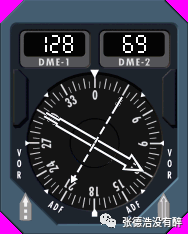
DCDU FCOM/DSC-46-10-40-20 Datalink Control and Display Unit
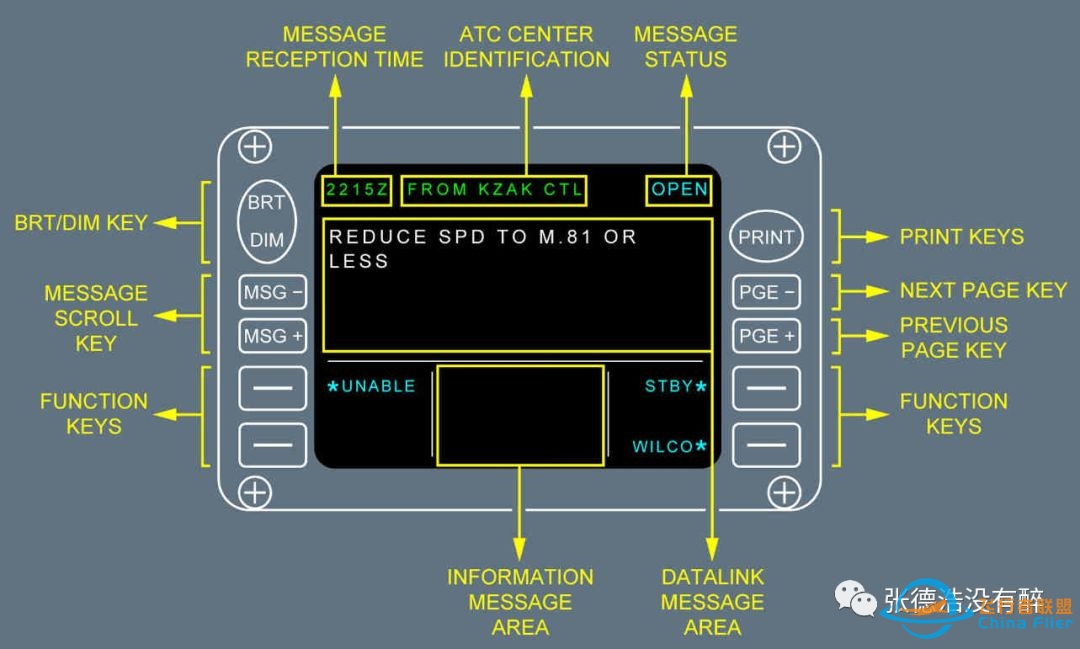
小桌板 Sliding Table
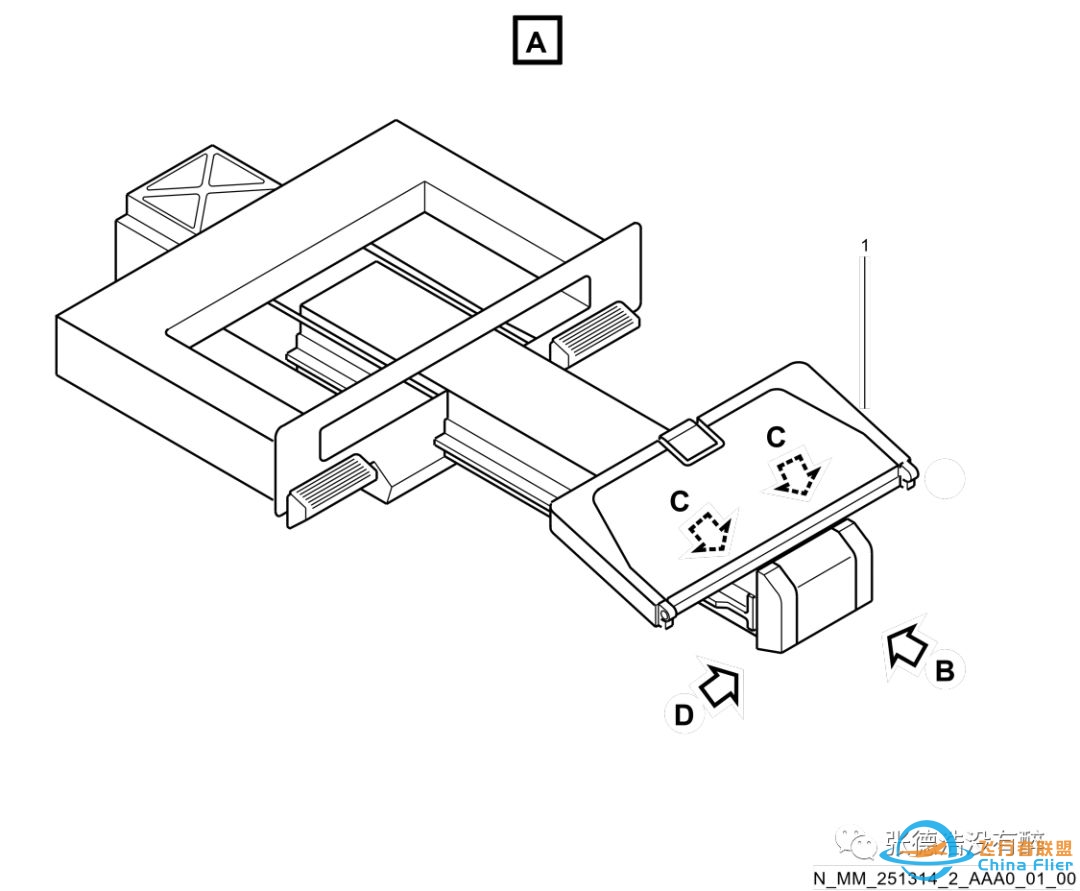
放这张图的意思是导轨也能掉东西进去
中央操纵台
MCDU FCOM/DSC-22_10-40-10 Multipurpose Control and Display Unit
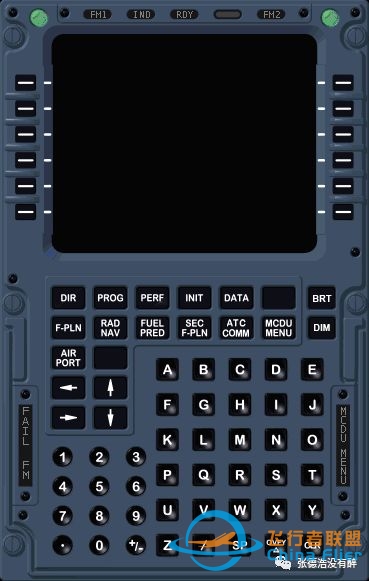
MCDU 信号牌

FM 1 and FM 2 (amber) The onside FM is failed
IND (amber) The onside FM detects an independent mode of operation while both FM are healthly.
RDY (green) MCDU has passed its power up test after it was turned off using its DIM key.
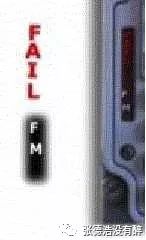
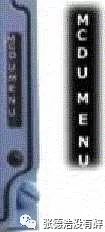
FAIL (amber) Indicates that the Multipurpose Control and Display Unit (MCDU) has failed.
MCDU MENU (white) Indicates that the flight crew should call up a peripheral linked to the MCDU (such as ACARS, ATSU or CFDS).
FM (white) Comes on while the flight crew is using the MCDU to display peripherals.
MCDU飞行管理操作
FCOM/DSC-22_20-50-10-28
MCDU AOC功能
FCOM/DSC-22_45
MCDU ADS-B IN操作
FCOM/DSC-34-SURV-20-40 ATSAW
MCDU CFDS集中故障显示/维护系统操作
FCOM/DSC-45-20 Maintenance System
MCDU ACARS数据链页面
FCOM/DSC-46-10-40-30 MCDU Datalink Pages
气象雷达
FCOM/DSC-34-SURV-30 Weather Radar
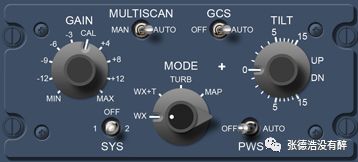
减速板 FCOM/DSC-27-20-30 Speed Brake
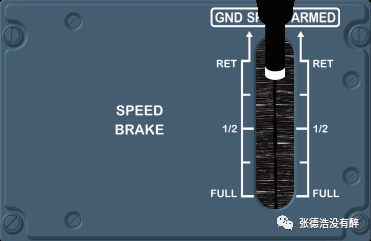
驾驶舱门 FCOM/DSC-52-40
切换旋钮
FCOM/DSC-34-NAV-10-20 ADIRS
FCOM/DSC-31-05-40 EIS

ECAM 控制 FCOM/DSC-31-30 ECAM Control Panel
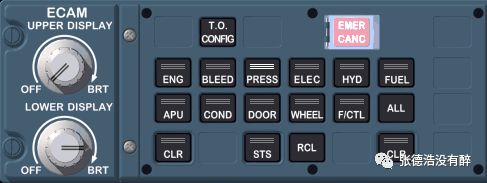
推力手柄
FCOM/DSC-22_10-40-30 Thrust Levers
FCOM/DSC-70-90-20 Thrust Levers
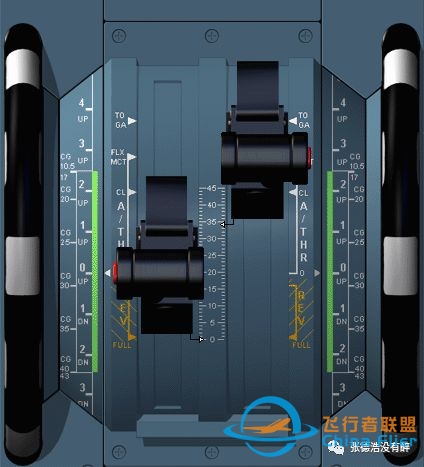
FCTM/AOP-10-30-10 电传操纵设计原理
NON BACK-DRIVEN THRUST LEVER CONCEPT 非自动驱动收回推力手柄的概念
Airbus has selected the non-back-driven thrust lever concept 空客选择了非自动驱动收回推力手柄的概念:
‐ The flight crew can easily and intuitively monitor the energy of the aircraft via current energy cues (speed, speed trend, engine parameters), and not via ambiguous thrust levers movement飞行机组可以通过当前的飞机能量提示(速度、速度趋势、发动机参数)方便、直观地监控飞机的能量而不是通过不精确的推力手柄的移动。
‐ When the autothrust is engaged, the Thrust Lever Position determines the maximum authorized thrust that may be commanded by the autothrust 接通自动推力时,推力手柄的位置决定自动推力可以指令的最大允许推力。
‐ When the flight crew uses manual thrust, the Thrust Lever Position determines the current thrust (as on any aircraft not equipped with autothrust). 当飞行机组使用人工推力时,推力手柄的位置决定当前的推力(如同其它没有安装自动推力的飞机)
俯仰配平轮
FCOM/DSC-27-20-30 Pitch Trim Wheel
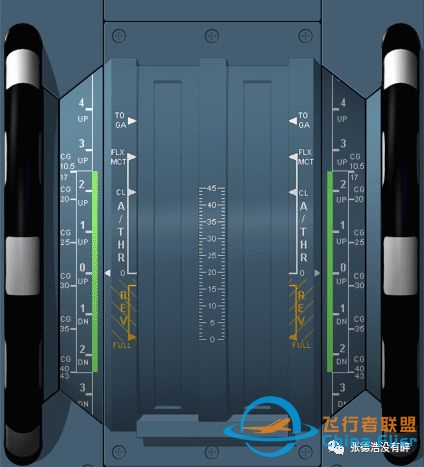
发动机
FCOM/DSC-70-90-20 ENG MODE selector and ENG MASTER Levers
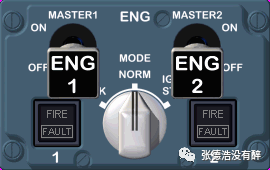
方向舵配平 FCOM/DSC-27-20-30
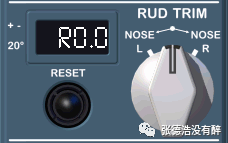
停留刹车 FCOM/DSC-32-30-20 PARKING BRK handle
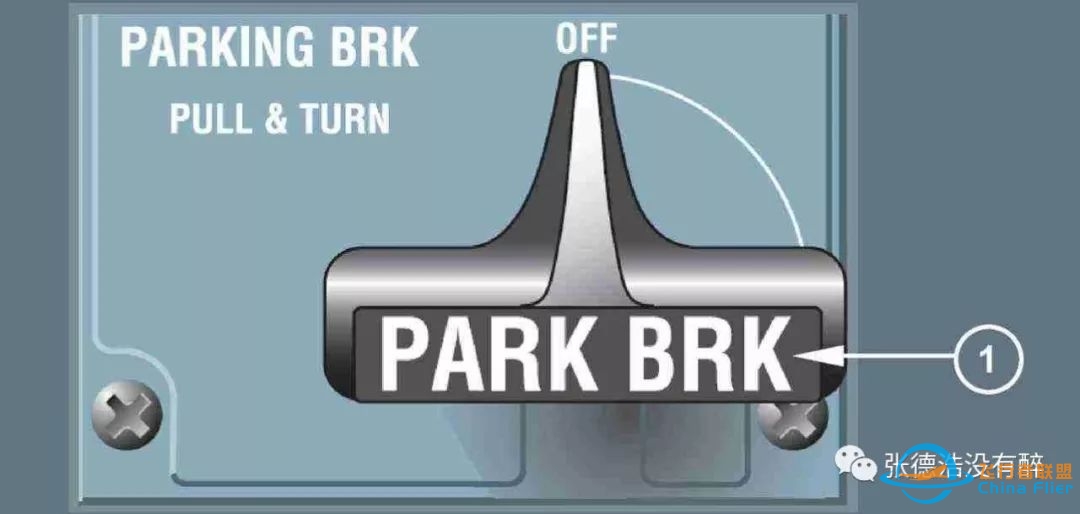
重力放轮 FCOM/DSC-32-10-40 Landing Gear Gravity Extension
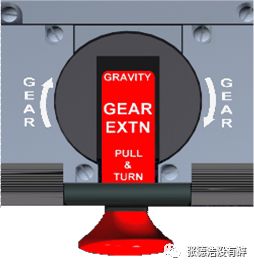
手持电话 FCOM/DSC-23-20-40 Passenger Address
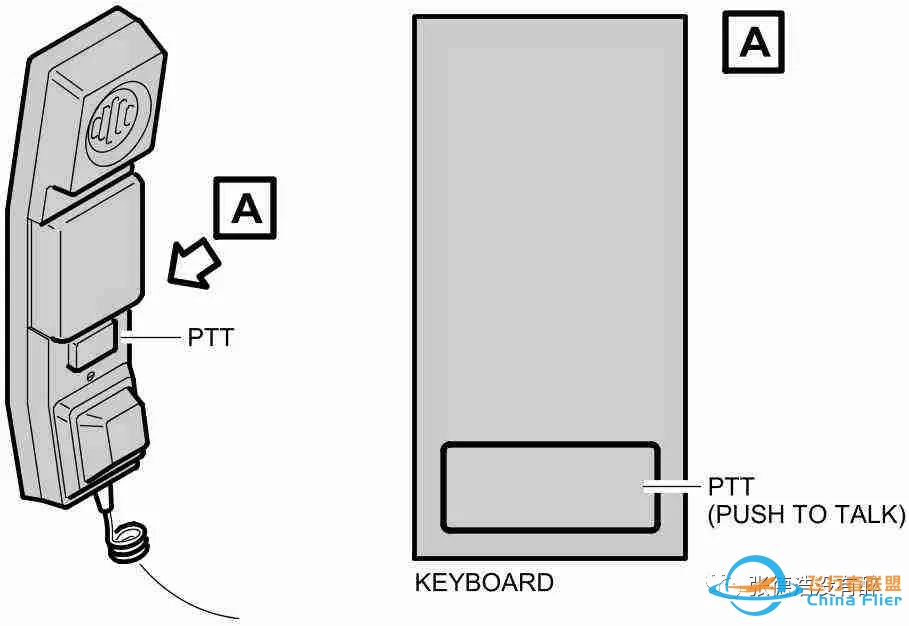
DFDR EVENT pushbutton
FCOM/DSC-31-60-20
Pressing this button (briefly) sets an event mark on the Flight Data records.

AIDS PRINT pushbutton
FCOM/DSC-31-60-30
Pushing this pushbutton causes the immediate printing of a specific report, depending on the flight phase. The crew may then use the MCDU to select another report for immediate printing.
ATC FCOM/DSC-34-SURV-10-20
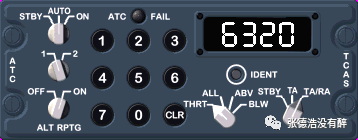
襟翼 FCOM/DSC-27-30-20
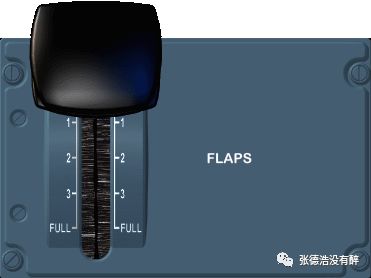
Before selecting any position, the pilot must pull the lever out of the detent. Balks at positions 1 and 3 prevent the pilot from calling for excessive flap/slat travel with a single action. 选择任何位置之前必须将手柄从卡位中拉起。位置1和3有阻挡,防止飞行员一次动作导致过多的襟缝翼行程。
Note: The pilot cannot select an intermediate lever position. 飞行员无法选择手柄档位之间的位置
打印机 FCOM/DSC-45-30 Printer
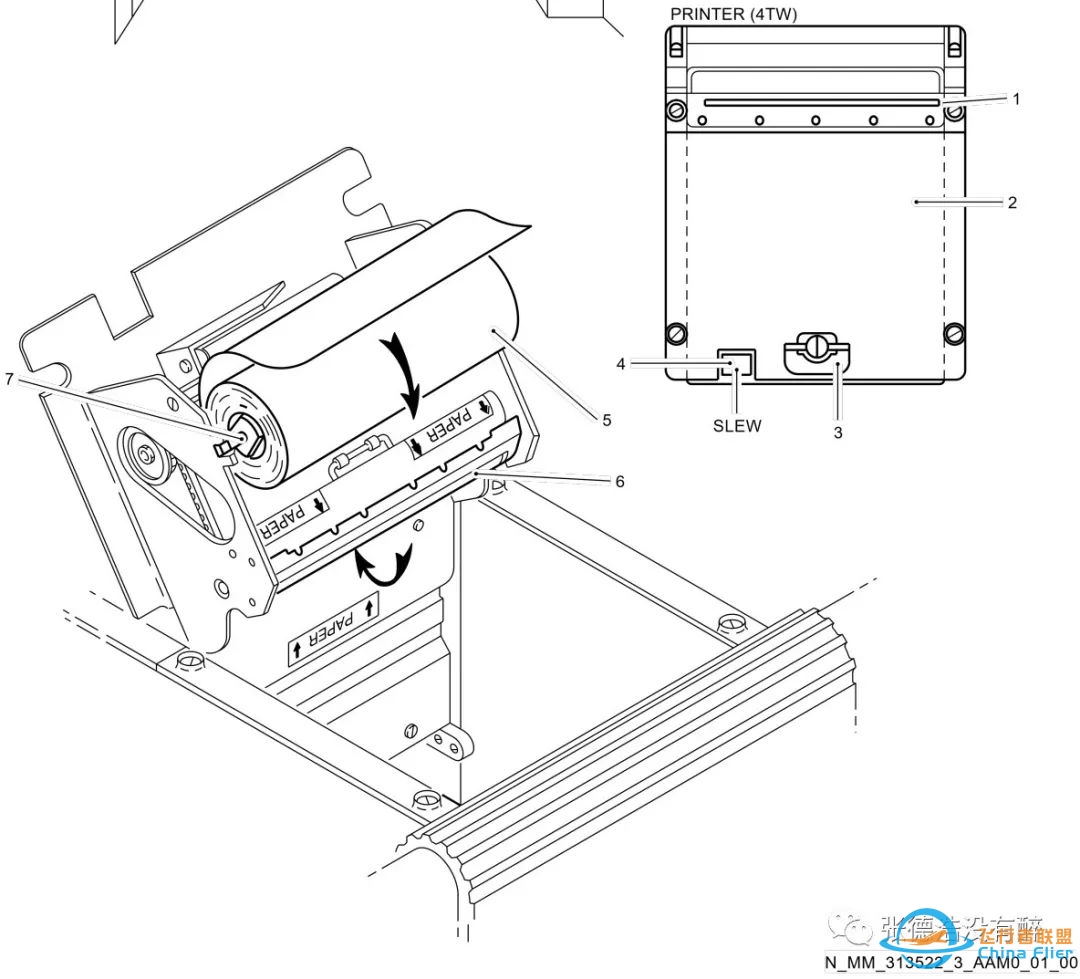
更换打印纸请教机长,手册没写
侧操纵台
侧杆 FCOM/DSC-27-20-30 Sidesiticks
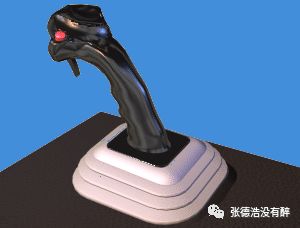
Each pilot has on his lateral console a sidestick he can use to control pitch and roll manually. Each sidestick is springloaded to neutral. 侧杆弹性回到中立
When the autopilot is engaged, a solenoid-operated detent locks both sidesticks in the neutral position. 当接通自动驾驶,侧杆电磁锁定在中立位。If the pilot applies a force above a given threshold (5 daN in pitch, 3.5 daN in roll) the stick becomes free and the autopilot disengages. 飞行员在侧杆上施加力量超过阈值(俯仰50 N,横滚35 N)侧杆被释放同时自动驾驶解除。
The hand grip has two switches: 手柄有两个开关
‐ Autopilot disconnect and sidestick takeover pushbutton. 自动驾驶解除和侧杆接管按钮
‐ Push-to-talk button.

Sidestick priority logic 侧杆优先逻辑
‐ When only one pilot operates the sidestick, it sends his control signals to the computers. 只有一个飞行员操作侧杆,信号传输给计算机。
‐ When the pilots move both side stick simultaneously in the same or opposite direction and neither takes priority, the system adds the signals of both pilots algebraically. The total is limited to the signal that would result from the maximum deflection of a single sidestick. 当俩飞行员同时移动侧杆并且没有取得优先权,系统代数叠加两边的信号。叠加的信号和单侧杆偏转的信号极限相同。
A pilot can deactivate the other stick and take full control by pressing and keeping pressed his priority takeover pushbutton. 飞行员可以通过持续按压优先权接管按钮抑制另一个侧杆获得完全操纵。
For latching the priority condition, it is recommended to press the takeover push button for more than 40 s. 为了保持优先权,建议按压接管按钮40秒以上。


如图所示,双侧杆输入量都大于2°,伴有“DUAL INPUT”音响提示

如图所示,左侧杆接管操纵,右侧杆被抑制,伴有“PRIORITY LEFT”音响提示
FCTM/AOP-10-30-10 电传操纵设计原理
OPERATIONAL BENEFITS 操作优势
The main operational benefits of the side-mounted stick 侧杆的主要操作优势:
‐ It enables a non-obstructed view of the main instrument panel 主仪表面板视线不受遮挡得以实现
‐ It is adapted for emergency situations (e.g. incapacitation, stick jamming, control failures) 适应紧急的情形(例如:失能、侧杆卡阻、操纵失效)
‐ It fits comfortably into the hand with a correct adjustment of the armrest 适当调节扶手即可与手舒适配合
‐ It makes the sliding table installation possible (e.g. for maps, documents, meals). 可以安装滑动桌板(例如:用于地图、文件、用餐)
When the autopilot is engaged 当自动驾驶仪接通时:
‐ The sidesticks are locked in neutral position (immediate tactile feedback) 侧杆锁定于中立位置(即时触觉反馈)
‐ There is no possibility of simultaneous input from the flight crew and the autopilot 飞行机组和自动驾驶仪不可能同时输入操纵
‐ The autopilot can be disconnected instinctively, at any time, by a firm pressure on the sidestick. 自动驾驶仪可本能脱开,通过在侧杆上施加一定程度的压力。
FCTM-AOP-10-30-20 电传操纵使用原理
侧杆的使用
Only one pilot flies at a time. 同一时间只能一个飞行员操纵。
If the PM wants to act on the sidestick, he/she must 如果PM想操纵侧杆,则必须:
‐ Clearly announce “I have control" 清晰报告“我操纵”
‐ Press and maintain his/her sidestick pushbutton, in order to get full control of the Fly-By-Wire system.按压并保持自己的侧杆按钮,以完全操纵电传系统。
The flight crew should keep in mind that sidestick inputs are algebraically added. Therefore dual inputs must be avoided, and will trigger aural and visual alerts.飞行机组应牢记侧杆输入是代数叠加的。因此必须避免侧杆双输入,否则会触发音响和目视告警。
Either pilot can make an input on their sidestick at any time. 任何时候两名飞行员的其中一个可以在其侧杆上输入。
Either pilot can deactivate the other pilot’s sidestick by pressing on their sidestick pb.两名飞行员的其中一个可通过按压其侧杆按钮使另一名飞行员的侧杆被抑制。
转弯手轮 FCOM/DSC-32-20-20 Steering Hand Wheel
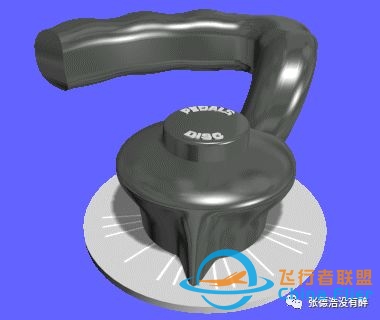
The steering handwheels, which are interconnected, can steer the nose wheel up to 75 ° in either direction. 内部相连的转弯手轮何以偏转前轮到双侧的75°
Note: The steering system centers the nose wheel automatically after liftoff. 转弯系统在离地后自动使前轮中立。
Rudder PEDALS DISC pb
Pressing this button on either handwheel removes control of nose wheel steering from the rudder pedals until the button is released. 按压任一手轮上的方向舵脚蹬断开按钮将脱开方向舵脚蹬对前轮的控制,直到松开按钮。
脚蹬
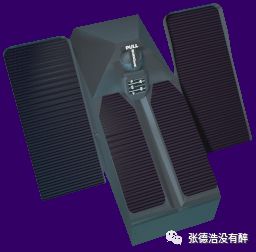
FCOM/DSC-27-10-10
Two pairs of pedals, which are rigidly interconnected, give the pilot mechanical control of the rudder. 飞行员通过两副刚性连接的脚蹬机械控制方向舵。
FCOM/DSC-27-10-20 RUDDER ACTUATION
There is no feedback to the rudder pedals from the yaw damping and turn coordination functions. 方向舵脚蹬没有偏航阻尼和协调转弯的反馈。
FCOM/DSC-32-20-10
The BSCU receives orders from: BSCU接收以下指令
‐ Captain's, and the First Officer’s steering hand wheels (orders added algebraically), or 机长和副驾转弯手轮代数叠加的指令,或
‐ Rudder pedals, or 方向舵指令,或
‐ Autopilot. 自动驾驶指令
The BSCU transforms these orders into nose wheel steering angle. That angle has the following limits, which depend on ground speed and the origin of the orders. BSCU根据以下基于地速和指令来源的限制,将指令转换成前轮转弯角。
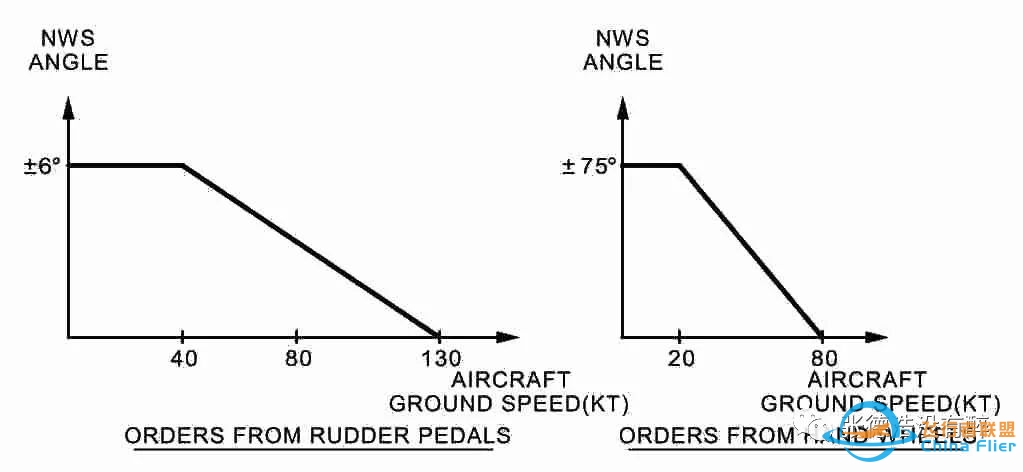
|
|